

Andrew Henderson
Founder of Nomad Capitalist and the world’s most sought-after expert on global citizenship.
ABOUT THE COMPANY
What we’re all about
MEET OUR TEAM
Meet our 80+ global team
We’re here to serve you
Your questions answered
TESTIMONIALS
Read our testimonials
Get free email updates

ACTION PLAN
Our flagship service for entrepreneurs and investors
ACTION PLAN ELITE
Create your Action Plan directly with the Mr. Henderson himself
CITIZENSHIP BY DESCENT
Claim a second passport based on familial connections
ALL SERVICES
Click here to see all our products and services
GOING OFFSHORE
Offshore Banking
Offshore Company
Offshore Trust
Offshore Gold Storage
Offshore For Americans
SECOND CITIZENSHIP
Second Passport
Citizenship By Investment
Citizenship By Ancestry
Dual Citizenship Benefits
EU Citizenship
SECOND RESIDENCE
Second Residence
Golden Visas
Residence By Investment
EU Residence
Tax Residence
FINANCE & INVESTMENTS
Tax Reduction
International Investment
Cryptocurrency
Foreign Real Estate
Asset Protection
NOMAD LIFESTYLE
Flag Theory
Lifestyle Design
Plan B Strategy
Hiring Overseas
Living In Eastern Europe
PASSPORT INDEX
Discover the world’s best passports to have in an ever-changing world
CITIZENSHIP MAP
Explore the citizenship options using our interactive citizenship map
Explore the tax details for countries using our interactive tax map
ALL RESEARCH
Click here to see all of our research and interactive tools
THE WORLD’S #1 OFFSHORE EVENT
Kuala lumpur | september 25-28, 2024.
Learn from our R&D playbook and meet like-minded people at our annual event.
NOMAD CAPITALIST THE BOOK
Andrew Henderson wrote the #1 best-selling book that redefines life as a diversified, global citizen in the 21st century… and how you can join the movement.
Birth Tourism: 31 Countries Giving Birthright Citizenship

Last updated October 28, 2020
Dateline: Kuala Lumpur, Malaysia
If you have spent any time on our blog, you probably already know that there are a number of ways to get a second passport , depending on how badly you want one.
We recently discussed 13 citizenships you could get rather easily by using one of the oldest tricks in the book: marrying a foreigner .
However, obtaining second citizenship for your children and future generations is just as important – if not more so.
For years, surveys such as The Best Places to Be Born , the Better Life Index , the Human Development Report , and many Quality o f Life Indices have chronicled where children are likely to have it best.
I recently discussed this in my article on tips for parents-to-be , suggesting that parents who apply our principles of international diversification practice something called “ birth tourism .”
If you live in the United States, you have probably heard the term “anchor baby” – when a non-citizen gives birth to a child in a country with birthright citizenship to gain residence and citizenship advantages – positioned in a bad light. However, there is nothing stopping you from using the same principle to give your kids a head start in other countries around the world.
Parents have a unique opportunity to choose the best country to give birth in. It’s an opportunity even western citizens should consider since even the “first world” United Kingdom failed to crack the top 20 places in which to give birth, falling behind the likes of Montenegro and Lithuania . The study concluded that children born in Britain suffer higher infant mortality rates than many emerging countries.
So, how can you take advantage of the quality of life in other countries to give your child a better future by securing them a second passport just by being born? In this article, we’ll tell you how and where you can take advantage of birthright citizenship to do just that, and maybe even earn a second passport for yourself in the process.
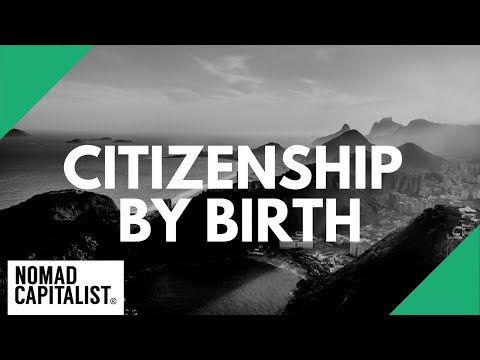
How Does Birth Tourism Work?
When it comes to determining a child’s citizenship at birth, countries usually apply one of two rights: jus soli (right of soil) or jus sanguinis (right of blood). Jus soli grants citizenship merely on the basis of being born “on the soil” of the country in question. Jus sanguinis determines the child’s citizenship based on the parents’ nationality.
Birth tourism is simple: give birth in a country that grants citizenship based on jus soli and provides benefits to all children born there. This will not only give your child a better qualify of life but also entitle them to a second passport immediately from birth. In many cases, parents of such children enjoy a faster naturalization timeline as well.
The process of “ jus soli ” is generally available to anyone who has a child within the territory of a country with birthright citizenship, even if they are a temporary resident or an illegal alien. The only people whose children do not qualify for instant citizenship are diplomats.
These countries offer what is called “ absolute jus soli ,” meaning that the biggest hurdle you’ll face in some countries is having to register your bundle of joy with the local authorities to secure their passport.
The United States and Canada are the only “first world countries” that offer unconditional citizenship to children born in the territory, although there are plenty of other excellent places that I would actually prefer to live in that offer this as well.
Here in Asia, Mainland Chinese parents often seek to give birth in Hong Kong to obtain the “right of abode” for their children. (Hong Kongers are Chinese citizens, but with special privileges to reside in Hong Kong.)
Of course, we know that the United States offers birthright citizenship for the same reasons that ancient Rome did: to increase the number of US tax-payers needed to pay off the country’s catastrophic debts.
Giving birth to a child in the United States is setting them up for a lifetime of taxes which they can’t even get out of without renouncing their citizenship. That means even opening a bank account for their college savings will require you to file paperwork with the US government.
What Countries Offer Birthright Citizenship?
For those who want to bestow their child with a second citizenship outside of the highly taxed western world, there are a number of places that offer “jus soli” or birthright of the soil.
Any child born within that country’s territory becomes a citizen at birth, and there are dozens of countries whose laws allow the practice. So, which countries automatically give a passport and citizenship to children born there, regardless of the nationality of the child’s parents?
Almost two decades ago, Ireland amended its constitution to end their practice as the last European country offering unconditional citizenship rights to children born to two foreign parents. Malta had amended theirs earlier, too. Other countries, such as Australia , have similarly tightened their laws.
But when you follow the birth tourism blueprint, you can forget about dual citizenship and give your child multiple citizenships .
Here is the full list of the best countries in which to give birth when seeking birth tourism options, excluding countries where a ban on the practice is currently underway.
- El Salvador
- St. Kitts and Nevis
- St. Vincent and the Grenadines
- Trinidad and Tobago
- United States
*For a child to become a Chilean citizen at birth, their parents must already have a temporary or permanent residence in Chile at the time of their birth.
**As of September 2020, Portugal is just a few formalities away from expanding its jus soli laws granting birthright citizenship to children born on Portuguese soil. Currently, children born in Portugal to foreign nationals can obtain citizenship at birth if at least one parent has been a resident for two years or more. The new law would reduce that timeline to one year.
This is an especially attractive change for Golden Visa investors in Portugal as they will now have the opportunity to bestow Portuguese citizenship on their children after just one year of residence.
The Best Birth Tourism Countries

Out of that list are a few gems…
Panama, Brazil, Mexico, and Argentina are particularly noted for their quality medical care , including for world-class facilities that make giving birth there not only easy but much cheaper than any country in the West.
Two of the countries — Dominica and St. Kitts and Nevis — sell economic citizenships for six-figure price tags and even charge for your children to receive a passport, as well. Other countries that used to offer citizenship by investment programs, such as Belize, are also attractive birth tourism options.
Similar to how US persons complain of illegal immigrants getting access to welfare benefits for their US citizen child, several countries on this list offer the ability to fast track your own naturalization as the parent of a local child.
In Brazil, the wait is only one year, prompting my friend Neil Strauss to suggest “knocking up a Brazilian girl” in his book Emergency . But in all seriousness, even foreigners on tourist visas can give birth on Brazilian soil, earning their child immediate Brazilian citizenship and a one-year timeline to their own naturalization. You can learn more about Brazil’s birthright citizenship laws here .
Most other countries will fast track the parents’ naturalization so that you will be able to get citizenship in two to seven years.
And surprisingly, some of these countries offer remarkably good passports . Holders of passports from Argentina, Costa Rica, Mexico , Panama , St. Kitts and Nevis, Uruguay , and Venezuela enjoy visa-free travel to all of Central and South America as well Europe’s borderless Schengen Area and almost every country in Europe.
Some even offer travel privileges to countries that westerners do not have visa-free access to, like Russia.
Guatemala passport holders enjoy all of these privileges save the right to travel to Mexico. Nicaragua citizens enjoy Schengen area access, but more limited options within the Americas. And even some of the lesser passports here allow for visa-free travel of some sort to the UK, Ireland, Malaysia, and Singapore.
For someone interested in raising their family in the world’s emerging markets, the Peruvian passport allows for more visa-free travel to Southeast Asia and South American countries than most “first world” passports.
Outside of Canada and Chile , none of these citizenships will allow your child to visit the United States visa-free. But if you’re reading this, you might actually view that as an added benefit rather than a detriment.
Keeping your child in a growing, more laissez-faire environment is the best way to make the most of his or her birth tourism citizenship.
Be careful that you have the most up-to-date information before giving birth overseas, as a number of countries have ended their policy of giving citizenship based on birthplace; these include Australia, most recently, as well as New Zealand, Ireland, France, Malta, the Dominican Republic (which led to tens of thousands of deportations ), and India.
Of course, only you can determine how far you want to take the second citizenship and birth tourism game in an effort to bestow as many nationalities on your children as possible.
And if you happen to be pregnant now, you could always book your hospital stay and join us for one of our upcoming events on the beach.
GET ACTIONABLE TIPS FOR REDUCING TAXES AND BUILDING FREEDOM OVERSEAS
Sign up for our Weekly Rundown packed with hand-picked insights on global citizenship, offshore tax planning, and new places to diversify.
Are you a US citizen?
YOU MAY ALSO LIKE

What is Panama’s Qualified Investor ‘Red Carpet’ Visa?
If you imagine Panama is full of dirt roads, rural squalor and economic disadvantage, think again....

How to Get Serbian Citizenship by Exception
What do Johnny Depp, Steven Seagal, and Ralph Fiennes have in common? Well, apart from the...

How Does Italy’s ‘La Dolce Visa’, Work?
How do you even begin to explain the charm of Italy for expats? Italy's attractions include...
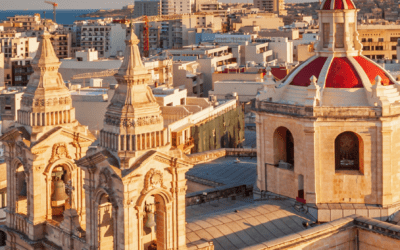
Malta’s Permanent Residence Program: The Ultimate Guide
Arriving in Malta at the break of dawn, the first glimpse of the island emerges from the quiet...
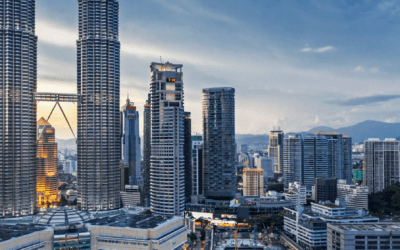
How to Pay Zero or Low Taxes in Malaysia (Territorial Tax)
Malaysia is beautiful, but don't just take our word for it. It's been officially recognised as the...
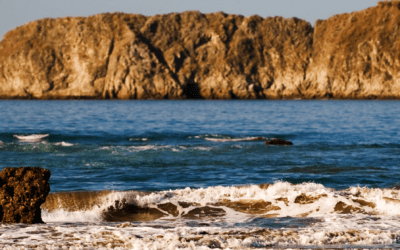
How to Pay Zero or Low Taxes in Costa Rica (Territorial Tax)
Costa Rica offers a stable political climate, a strong expat community, and good infrastructure....
Get the Right Passport for You
We’ve helped our clients obtain 28 different country’s citizenships, from often-overlooked ancestry programs, to fast-tracked investment options, and even exclusive programs for HNWIs. Don’t limit yourself; let Nomad Capitalist’s unbiased approach help you find the best option.
What do you want to accomplish?
Let us know your goal and we will tell you how we can help you based on your details.
REDUCE TAXES OFFSHORE
CREATE A GLOBAL PLAN B
DIVERSIFY AND PROTECT WEALTH

UNITED STATES

UNITED KINGDOM

EU COUNTRIES

Tax Amount ($US Dollars)
POLITICAL INSTABILITY
ECONOMIC INSTABILITY
MISSED OPPORTUNITIES
TRAVEL RESTRICTIONS
HIGH TAX LIABILITIES
RISK MANAGEMENT
MARKET PROTECTION
WEALTH PRESERVATION
OPPORTUNITY CAPITALIZATION
ESTATE PLANNING
Email Address
We handle your data according to our Privacy Policy . By entering your email address you grant us permission to send you the report and follow up emails later.
- Personal Injury Practice Areas
- Construction Accidents
- Motor Vehicle
- Bus Accident
- Truck Accident
- T-Bone Accident
- Train Accident
- Hit And Run
- Pedestrian Accident
- Rollover Accident
- Slip & Fall
- Nursing Home Negligence
- Medical Malpractice
- Wrongful Death
- Product Liability
- Bicycle Accident
- Drunk Driver
- Burn Injury
- Birth Injury
- Uber Accident
- Case Studies

- Immigration Immigration Services
- Citizenship & Naturalization
- Employment Immigration
- Deportation and Removal Defense
- Family Immigration
- Investor Visa
- Marriage-Based Visa
- Immigration Mandamus Litigation
- Asylum & Refugee Protection
- Nonimmigrant Visas
- Student Visa
- Fiance Visa
- Success Stories

- Brad Show Live
- Legal Insights
- Get In Touch
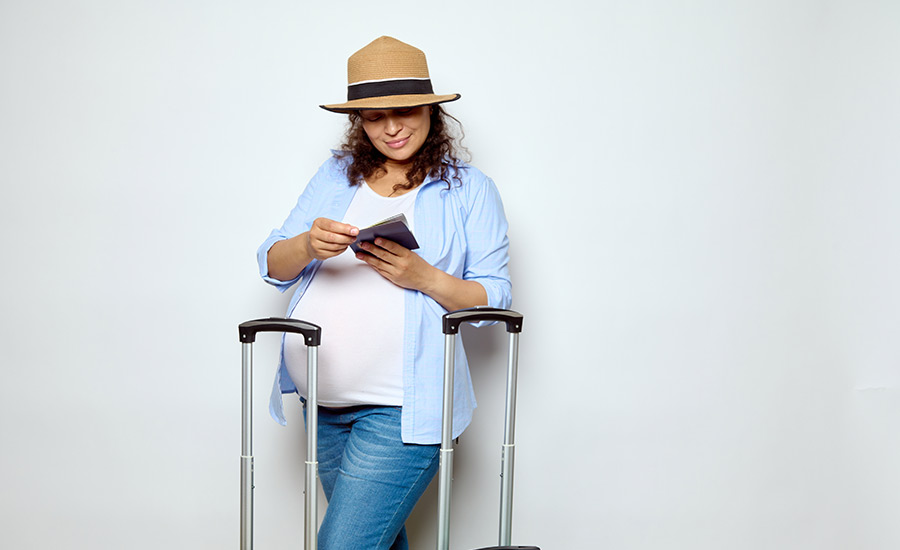
Giving Birth In The US On A Tourist Visa: A Detailed Guide
Each year, the United States become birthplace of 33,000 babies while their mothers visit the country as tourists — on top of hundreds of thousands more born by women on temporary visas and illegal aliens.
This alarming statistic has led to legal changes for giving birth in the U.S. on a tourist visa.
We’ll explain what birth tourism is and cover the legal consequences of having your baby in the U.S. as a tourist. We’ll also share the most recent legislation updates regarding tourist visas for pregnant women.
Contact Spar & Bernstein
Table of Contents
What Is Birth Tourism?
Birth tourism is the practice of traveling to another country, specifically to give birth in that country. Birth tourism often occurs on a temporary visa, such as a tourist visa.
Considered one of the best countries to give birth in, the U.S. is an attractive place for birth tourism. The motivation behind birth tourism in the U.S. includes:
- Perceived stability : Accepted as a stable and prosperous country, the U.S. is an attractive place to give birth and raise a child.
- Citiznship benefits : Giving birth in the U.S. makes your child a U.S. citizen, which gives the child access to education, healthcare and potential career opportunities.
- Family reunification: Giving birth in the U.S. can be used as a pathway for you and your spouse as a U.S. citizen’s parents to obtain legal immigration status in the U.S.
However, birth tourism in the U.S. is viewed as a potential threat to national security , because:
- It can lead to the fraudulent acquirement of U.S. citizenship, bypassing the traditional immigration pathways and security screening procedures
- It can strain healthcare and public services, impacting the well-being and security of citizens and legal residents
As a result, birth tourism has provoked numerous discussions about tightening regulations to ensure that those who enter the U.S. come to the country for legitimate reasons and are not compromising national security.
What Happens If You Give Birth In The US On A Tourist Visa?
Giving birth in the U.S. on a tourist visa can have certain legal consequences for both mother and child.
1. Legal Implications For The Mother
Giving birth in the U.S. on a tourist visa does not automatically grant you the right to stay in the country based on the birth of your child.
Your visa status remains unchanged and you will be typically expected to leave the U.S. before your visa expires. If you do not leave the country after the expiration of your visa, this will be considered as overstaying a visa , which may result in future travel restrictions or challenges when applying for a visa for subsequent visits.
In addition, if your primary purpose for entering the U.S. was to give birth and you did not truthfully represent your intentions to immigration officials, you can be charged with visa fraud due to willful misrepresentation of a material fact (that you were planning to have your baby in the U.S.) or face visa denial for future visa applications, due to credibility concerns.
While giving birth in the U.S. does not directly grant you any type of immigration status, there may be pathways that can help you remain in the U.S. permanently.
These alternatives can include family-sponsored visas, employment-based visas or other immigration categories. Talk to an experienced immigration attorney to understand your options.
2. Legal Implications For The Child
If your child is born on U.S. soil, they will acquire U.S. citizenship through the principle of jus soli (birthright citizenship).
- In addition to citizenship, being born in the U.S. allows your child to:
- Apply for a U.S. passport
Hold dual citizenship, depending on your home country’s laws
Apart from benefits, however, U.S. citizenship also comes with certain obligations. If your child is born in the U.S. and therefore is a U.S. citizen, your child is likely to:
- Have residency obligations, such as potential taxation on global income and the need to enter and exit the U.S. using a U.S. passport
- Face immigration challenges, as they may need to navigate U.S. immigration regulations, even if they choose not to reside in the U.S.
Because each situation is unique, the legal implications can vary based on the specific circumstances. We recommended seeking professional advice from a reputable immigration law firm, like The Law Offices of Spar & Bernstein.
With five decades of immigration experience, our team at The Law Offices of Spar & Bernstein has supported thousands of people in various immigration situations, from getting married on a tourist visa or navigating a visa overstay to removing conditions on a Green Card and facing the challenges of divorce after Green Card .
Schedule a consultation with our caring and tenacious team for professional guidance and advice in your situation. We will explain the legal implications for yourself and your child and share our advice on next steps.
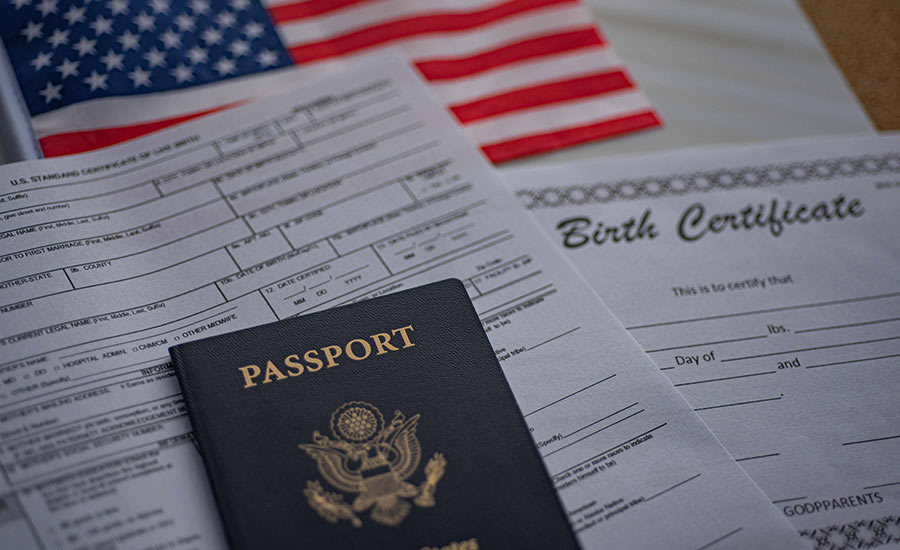
New Rules For Giving Birth On A Tourist Visa In The US
As per the U.S. government, traveling to the U.S. and giving birth with the intention to obtain U.S. citizenship for your child is not an acceptable reason for granting a B nonimmigrant visa.
According to the updated temporary visa regulations , which became effective as of January 22, 2020, the consular officers have the authority to deny a B nonimmigrant visa to individuals they believe intend to travel solely for the purpose of obtaining U.S. citizenship for their child through birth.
However, the U.S. government recognized that foreign nationals may wish to travel to the U.S. for medical treatment while pregnant , which is different from birth tourism.
If you need to visit the U.S. for medical treatment while pregnant, you must submit your visa application along with:
- A legitimate reason to travel to the U.S. for medical treatment, such as a condition requiring specialized medical expertise, availability of advanced medical technology, chronic disease management, participation in a trial or experimental treatments that are not available in your country, or seeking a second opinion
- A confirmation by a medical practitioner or facility stating that they agreed to provide treatment
- An estimated duration of stay in the U.S.
- A projected cost of treatment
- Proof that you can cover your medical treatment, transportation and living expenses, either on your own or with pre-arranged assistance from other parties
The new rule restricting tourist visas to pregnant women does not affect :
- F-1 academic visa applicants
- M-1 vocational student visa applicants
- H1-B work visa applicants
- Those seeking lawful permanent residence in the U.S.
If you are considering visiting the U.S. on a tourist visa, especially if you are pregnant, talk to legal experts to review the latest updates and get professional recommendations on next steps.
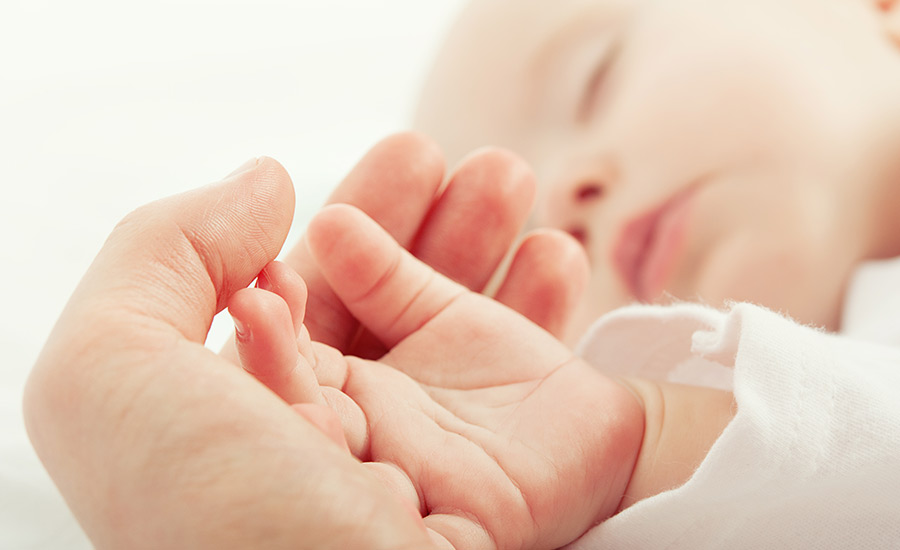
Need Legal Advice? Contact Spar & Bernstein
With a long-standing history and commitment to serving clients with care and compassion, our experienced team at The Law Offices of Spar & Bernstein provides a guiding hand in key areas of immigration, from nonimmigrant visas and marriage-based visas to family immigration and waivers .
Giving birth in the U.S. on a tourist visa can be extremely overwhelming. To help you in this life-changing situation, our knowledgeable and compassionate lawyers will:
- Provide personalized advice based on your specific situation
- Assess your visa status
- Explain your rights and obligations as a foreign national in line with the changing policies and regulations that might affect your situation
- Provide insight into the implications of U.S. citizenship for your child
- Explore various legal options for you and your child, such as addressing potential overstays, adjusting your visa category or seeking pathways for obtaining legal immigration status
- Review your documentation to ensure accuracy and compliance with immigration regulations
- Submit your application for extending your stay or changing your visa category, along with all necessary documents
- Handle the communication with immigration officials on your behalf
- Represent you and advocate on your behalf in case of visa denial, overstay issues or other problems
- Provide peace of mind while you focus on caring for and bonding with your child
With Spar & Bernstein, you can rest assured that you and your child are in good hands.
Schedule a consultation
Giving Birth In The US On A Tourist Visa: Key Takeaways
Giving birth in the U.S. on a tourist visa can have a number of legal implications for both you and your child.
You will likely be denied a visa if your intentions to travel to the U.S. are only related to birth and the potential benefits that offers.
However, you can still be eligible for a visa if your medical condition requires treatment in the U.S. and you are expecting a child.
If you have questions about birth tourism or need to get a visa for medical treatment in the U.S. while pregnant contact our experienced and compassionate immigration lawyers at Spar & Bernstein.
We will help you navigate this complex situation by taking care of all the documents and procedures needed to maintain your legal status and pursue pathways to maintain in the country, if desired.
Work with our immigration attorneys
Bradford H. Bernstein
This article was written and reviewed by Bradford H. Bernstein, a second-generation leader at Law Offices of Spar & Bernstein, P.C., who has helped over 100,000 clients with immigration and personal injury issues. Brad joined the firm in 1993, became a partner in 1997, and assumed leadership in 2000 after Harry Spar retired.

- Australia edition
- International edition
- Europe edition

‘A lot of these women had no idea what they got into’: inside the world of birth tourism
A new documentary follows Chinese women who travel to the US to give birth so their children can have citizenship
I t started a decade ago, when Leslie Tai, who lives outside San Francisco, heard from a woman she’d met in Beijing and who told her that she was staying for a few months in Los Angeles. Tai’s friend was evasive about the purpose of her visit, until the pair finally had a video call and Tai watched her friend oil a round belly on camera. “She said, ‘I have a surprise for you,’” Tai recalled. “‘I’m having an American baby.’” Tai, who knew that her friend came from a poor family and was dating a wealthy older artist in China, asked if he had friends in southern California. “And she was like, ‘No, honey, you don’t need friends to do what I’m doing.’”
She was part of the birth tourism industry, which boomed during the Obama years, when scores of pregnant Chinese women of means invested in package deals that cost anywhere from $30,000 to $100,000 and granted buyers the ability to fly across the world and stay for three months at a facility that catered to expectant mothers looking to score US citizenships for their children or skirt the one-child policy that was the law in China until 2015.
Tai, a Chinese American documentary film-maker, wasted no time embedding in the group home where her friend was waiting out the final days of her pregnancy, alongside a handful of other expectant mothers. “I got kind of obsessed with this idea of how on the outside, it’s just nondescript suburban tract housing, with palm trees everywhere, but then behind closed doors there’s this whole world with multiple families living in close quarters and all in this crazy intense situation of waiting to have a baby,” she said.
Securing subjects’ permission was not easy for Tai. “I started asking my aunties and uncles like, do you know anybody who is involved in this industry? They were all like, yeah, actually, my cleaner, or our nanny from when our kids were children ended up working in one of these maternity hotels,” she recalled. Tracking down subjects and winning over their trust took an enormous amount of care and strategy. “Even though what they were doing was not illegal, they had reservations, so it was not like I came in like guns blazing.” Tai’s English fluency proved a valuable resource as she pursued mothers-to-be, nannies, drivers and cooks to grant entry to their private world and anchor the vignettes in her film. “I made myself of service because actually, when they saw me, they were like, ‘Oh my God, you speak English. Can you help me call PG&E?’” She had given similar help to her friend, who did not speak English, in the delivery room.
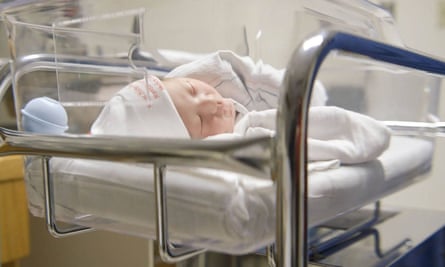
Nearly 10 years in the making, Tai’s entrancing and heartrending film How to Have an American Baby provides viewers insider access to a phenomenon that took place behind closed doors and on Chinese websites where brokers offered pregnant women package deals as if they were cruise holidays. Money-hungry operators offered help obtaining visas and lining up rooms at specialized facilities. There were enormous industrial maternity hotels, as well as private Beverly Hills homes and boutique group homes where up to five women at a time waited out their births and holed up for the 30-day postpartum quarantine that is a Chinese tradition. Then, more often than not, they returned to China.
“By and large, the majority of the women that were coming were simply coming to evade the one-child policy,” Tai said. Some, though, were mistresses, as Chinese law did not allow unmarried mothers to give birth in public hospitals until earlier this year. Sales agents knew how to tap into maternal anxieties, playing up the supposed advantages of US citizenship. “There’s a lot of misinformation that the customers are receiving,” Tai said. “They think that there’s universal healthcare. They think that there’s universal education. It’s sold as a really good investment, but they’ve been lied to.” Babies born in the US have the right to declare their American citizenship at age 18, and apply for green cards for their families when they turn 21. “There was a sentiment of: who knows what the world is going to look like in 18 years? If China goes to hell, what if America goes to hell, whatever, they have two passports.”
Tai’s film is less concerned with policy than offering a textured portrait of the day-to-day, minute-to-minute experience that the mothers went through. The exteriors are mostly shot at night on suburban streets of southern California and the interiors sit with women bathing their babies or microwaving cups of tea while they wait to go into labor. A meditative quality pervades the work, which weaves several vignettes together into a broader portrait of women navigating a terrifying life phase in a strange land. “A lot of these women had no idea what they got into,” Tai said. “It’s almost like they were sold on the pretty pictures of this vacation and then when they come here, they realize: ‘My family’s not here, and I’m having a baby. Oh, my God, I’m sequestered with a bunch of pregnant women. Plus there’s all the drama living in the suburbs. It’s like Real Housewives from hell.”
While many of the visitors enjoyed daily meal deliveries and shopping excursions, they were surrounded by people who saw them as financial marks. The doctors in the film offer all-cash birthing options (vaginal for $3,000 or caesarean for $5,000) with the tenderness of night market vendors hawking ripoff handbags. Tai captured a maternity hotel worker saying about the residents: “If you become too friendly they will use you. The more you give them, the more they complain.”
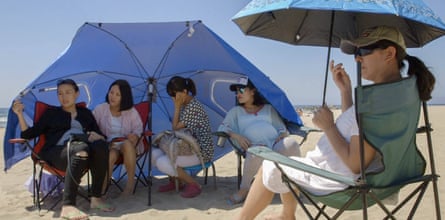
The birth tourism world underwent major upheaval over the course of filming and editing, to the point where Tai said her film was “like a time capsule”. With the rise of Trump and the travel restrictions around Covid, and anti-Chinese and anti-American sentiment flying in both directions, the phenomenon has come to a standstill.
Tai had her own changes as well, namely, the birth of a baby this past January, a few weeks before the world premiere of her film at a festival. “I definitely took a lot of lessons from watching all these births, like making sure I was set up with the right support,” she said.
And now she is in what she called “double postpartum mode”, watching both her baby and film find their footing in the world. While the film has a jaw-dropping concept at its core, the bulk of the footage focuses on the mundanity and emotion that color the days leading up to and following childbirth, as well as the terror and ecstasy of labor itself. (There is a birthing scene more honest and beautifully gruesome than any video they’ll show you at birth class.) Tai’s ambition for her movie is strikingly tender. “I want to fight for the moving image that allows you to really sink into the humanity of the people, regardless, and even in spite of, how controversial the situation is,” she said.
How to Have an American Baby airs on PBS on 11 December
- Documentary
- US television
Most viewed
'All about the money': How women travelling to Canada to give birth could strain the health-care system
Birth tourism leads to complaints of compromised care at b.c. hospital.

Social Sharing
Women travelling to Canada to give birth to babies who will automatically become Canadian citizens are prompting concerns about the strain they may be putting on the health-care system, The Fifth Estate has found.
Canada is one of fewer than three dozen countries that follow the practice of citizenship based on birthplace, regardless of parents' nationality or status.
At one British Columbia hospital with a high concentration of such deliveries, complaints have arisen that the influx of these non-resident patients — also known as birth tourists — has led to compromised care for local mothers-to-be and struggles for nursing staff.
Some of these patients fail to pay hospital and doctors bills, leaving taxpayers and individual care providers on the hook.
"Most of them, they get the Canadian passport, and then they leave the country," said Dr. Mudaffer Al-Mudaffer, a B.C. pediatrician and neonatologist who sees babies of non-residents when they need critical care. "It affects the integrity of the fairness of the health system."
No statistics are available regarding how many people are travelling to Canada specifically to ensure their child is born here and will have a Canadian passport.
But figures from the Canadian Institute for Health Information and several Quebec hospitals indicate there were about 5,000 non-resident births across the country in 2018, an increase of nearly 15 per cent over the previous year.

In the fall of 2019, Cathy Shi arrived in Richmond, B.C., from Shandong, on China's east coast, to give birth to her third child. She said through a translator that she wanted her unborn child to have more opportunities.
"My concern is about their education, such as going to university. If the kid wants to live in Canada, it would be convenient for them if they're born here."
Handful of hospitals
At this point, the practice of birth tourism appears to be concentrated in a handful of hospitals in Quebec, Ontario and British Columbia.
At the Richmond Hospital, south of Vancouver, non-residents make up nearly a quarter of all births, according to records obtained from Vancouver Coastal Health, the health authority which runs the hospital. In many ways, that hospital can be seen as a test case for how this issue could play out elsewhere as numbers continue to climb.
The health authority declined a request for an interview with The Fifth Estate and issued a warning directing its staff not to speak to the media.
Despite that, four current and two retired nurses shared their concerns, requesting that their identities be protected.
- Watch "Passport babies" on The Fifth Estate on CBC-TV Sunday at 9 p.m.
Since 2013/14, the number of non-resident births has tripled at the hospital. The patients — many from China — pay privately for their care, often in cash, may not speak English and are unfamiliar with the Canadian health-care system. The nurses who spoke to The Fifth Estate say the influx has led to increased workloads and has compromised care.

"There are times when ... the people living here don't get the service that they need," one nurse said.
When the unit was very busy, one nurse said services like prenatal tests to check the baby's health, labour inductions and other tests to check fetal and maternal risk factors would be delayed or cancelled.
"We would often have to decide whose need was greatest and abandon the rest for the next day where we would face the same situation again," she said.
"Our normal scheduled or add-on C-sections lie here all day and then they take the IV out, we send them home and say come back tomorrow. A private pay never goes home — she gets her C-section that day," said another nurse.
"She will be fit in somewhere because nobody wants to lose that $5,000. But our normal people are lying there all day, no food or drink, waiting and nobody's interested in moving them."
Some hospitals, like Sunnybrook Health Sciences Centre in Toronto, have taken steps to limit the number of non-resident births in order to prioritize residents of their own communities. That hospital says it won't treat non-residents patients without Ontario Health Insurance Plan coverage.
- Ottawa probes birth tourism as new data shows higher non-resident birth rates
'It's fraudulent': Former immigration official says action needed on 'passport babies'
When asked in an email why the Richmond Hospital doesn't have a similar policy, Carrie Stefanson, a public affairs representative with Vancouver Coastal Health, said: "VCH cannot speak for other hospitals or health authorities. VCH will never deny urgent and emergent care based on ability to pay or where a patient is from."
The hospital requests deposits for privately paid births: $10,000 for a vaginal birth and $16,000 for a caesarean. More than $18 million has been invoiced for non-resident births since 2017, according to data released through freedom of information by Vancouver Coastal Health.
Nursing staff say they have not seen this money go into easing their workloads.
"The amount of money that's coming into Richmond from the private pay, it doesn't make our staffing better," said one nurse.
Their union says that is a problem.

"I certainly think adding additional patients into a health-care system that isn't staffed appropriately, isn't funded appropriately, is causing strain," said Christine Sorensen, president of the BC Nurses' Union.
She said the union has regularly heard complaints from nurses at Richmond Hospital but they have not filed a formal complaint with the hospital.
The health authority declined to answer a question about how it has responded to complaints from nursing staff.
Financial incentives within the medical system
Two doctors at the Richmond Hospital have delivered 1,300 of the 2,206 babies born to non-residents there since 2014, according to documents released through freedom of information.
While the health authority will not disclose their names, insiders and birth tourism company representatives say Dr. Xin-Yong Wang and Dr. Brenda Tan, two Mandarin-speaking family doctors, see the majority of these patients for prenatal care and delivery.
Both appear on multiple websites of companies advertising services such as assistance with immigration, travel and housing to women looking to come to Canada to give birth.
Wang said the companies do not have permission to use his name.
Tan did not respond to interview requests and a list of questions sent to her.

Wang and Tan billed the province $272,198.50 and $428,456.17 respectively in the 2018/2019 fiscal year, according to data publicly available through the province. Those billings do not include earnings from non-resident patients because they pay privately.
There are no limits on what physicians can charge outside the public system in British Columbia, but information from birth tourism company websites suggests that these doctors earn at least $100 per prenatal visit and more than $2,500 for a delivery, several times more than could be billed through the public system for the same services.
In an interview, Wang declined to respond to questions about how much he was earning from birth tourism but said he was not motivated financially to take on these patients.
"It's like a dessert — occasional patients like this is fine, and it's pretty financially rewarding … they are a small percentage of our overall income."
Nurses who spoke to The Fifth Estate said the financial incentives within the health-care system are a problem.
"It is all about the money. If there was no financial income for the hospital or physicians, the private pay would have been out of the door a long time ago," said one nurse.
Unpaid bills
While these births are bringing in money, bills owed to both health authorities and individual doctors are not always paid.
According to documents released by Vancouver Coastal Health, more than $2 million is outstanding as a result of non-resident births since 2017 at the Richmond Hospital alone. This does not include any debt that has been written off.
Births at the Richmond Hospital represent 11 per cent of overall non-resident births outside Quebec, according to 2018 data from the Canadian Institute for Health Information.
No national financial data exists on how much revenue is outstanding as a result of non-resident hospital bills across the country.
But some say the health-care system and Canadian taxpayers are losing out.
Al-Mudaffer said having an uninsured baby in neonatal intensive care can cost $10,000 a day just for the hospital bed, not including doctors' fees.
Watch Dr. Al-Mudaffer express concerns about birth tourism:
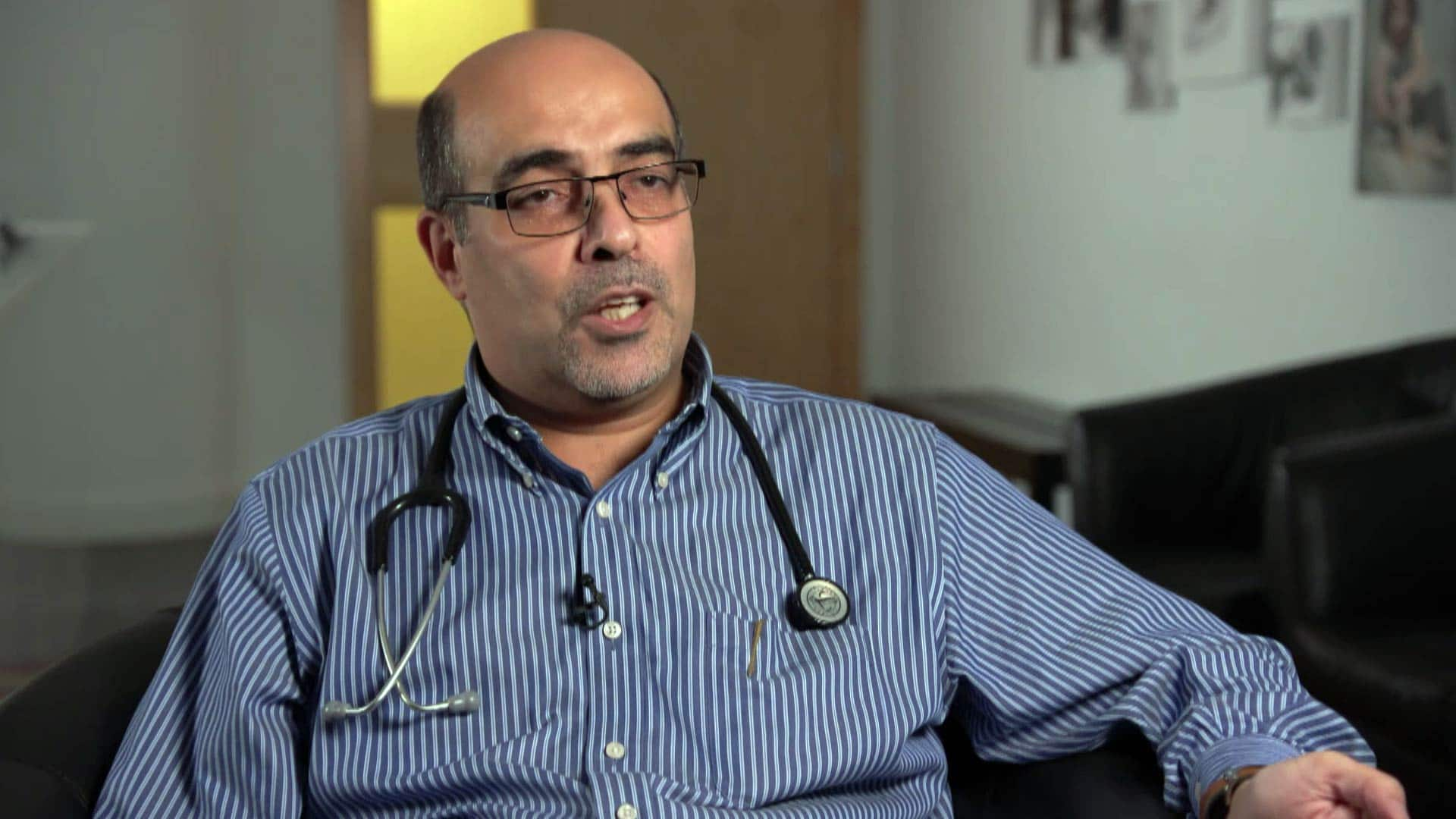
Dr. Mudaffer Al-Mudaffer
He said he's seen large bills for families with babies requiring multiple nights and even weeks in the NICU.
"You can easily acquire a bill of $100,000 to pay the health authority, and that's why they can't pay it, you know? And they leave the country without paying," said Al-Mudaffer.
He said he has seen hundreds of thousands of dollars in bills go unpaid at the Royal Columbian Hospital where he works, but Fraser Health, which runs that hospital, said it could not confirm this amount.
The Fifth Estate requested provincial numbers on unpaid bills from the British Columbia government but was told these numbers were not tracked provincially.
"Obviously if any bill is unpaid, I'm concerned about that because that's money that we could and should be spending on something else or saving the health-care system so of course we're concerned about it," said B.C. Health Minister Adrian Dix.
Even with little formal research to examine the practical implications of a growing number of non-resident births on the Canadian health-care system, Dix said "we are handling that situation.
"It's two per cent … of total births in British Columbia, so it's an issue but there are other issues."

But it's not only hospital fees going unpaid. Al-Mudaffer said when he sees birth tourists, he only gets paid three out of 10 times.
He is not alone. Dr. Kathleen Ross, president of Doctors of B.C., has personally been affected by unpaid bills and has called for a national conversation on the issue.
"Our federal government needs to find a way to disincentive people coming to the country to have access to citizenship and to our health-care support," she said.
Federal research planned
Marco Mendicino, the newly appointed minister of immigration, refugees and citizenship, declined an interview with The Fifth Estate .
But the department wrote that while "statistics indicate that birth tourism is not widespread, the Government of Canada recognizes the need to better understand this practice."
It said it has started work with the Canadian Institute for Health Information and Statistics Canada to integrate health and immigration data that would allow for a better understanding of the practice of birth tourism by looking at visitor visas and births.
Immigration, Refugees and Citizenship Canada anticipates results from this research will be available in the spring.
Cathy Shi said she hasn't thought much about criticism of birth tourism and isn't receiving any government benefits here.
"We may come here often for travelling around, living or even investing. People are not just looking for status by having a baby here. They will have established a connection to Canada and later on some may apply to immigrate."
For more information, on this story please contact Annie Burns-Pieper [email protected]
ABOUT THE AUTHOR

Annie Burns-Pieper is a freelance investigative reporter and producer. She has a particular interest in themes of gender equality, public safety and health.
- @Aburnspieper
Related Stories
- New survey helps Winnipeg health-care facilities fix issues quickly, sometimes before patient leaves
- N.S. asked health-care workers for ideas to fix the system. Here are some the public didn't get to see

What is birth tourism and is it legal?
Disclaimer: Some posts on Tourism Teacher may contain affiliate links. If you appreciate this content, you can show your support by making a purchase through these links or by buying me a coffee . Thank you for your support!
Birth tourism isn’t a term we hear everyday, but it is in actual fact a real thing! Want to learn all about it? Read on…
What is birth tourism?
Anchor babies, future life improvement, two-child policy, right of abode, birth tourism scrutiny in the us, changing citizenship laws, jus sanguinis , birth tourism in north america, birth tourism in hong kong, birth tourism- further reading.
As the name suggests, birth tourism is the action of travelling to a different destination for the purpose of giving birth. There are various reasons as to why pregnant people decide to take this course of action, which I will go into below. It is not a new phenomenon, nor is it something which people are particularly secretive about when they engage in it. It is more common in the US, Canada and Mexico as these countries famously offer birthright citizenship.
It is worth nothing that birth tourism is completely unrelated to the concept of a babymoon, which you can read about here !

Why does birth tourism happen?
So, why does birth tourism exist? One reason is that people may want to give birth where it’s free or at least much cheaper than their home country. They also may feel like other countries are able to provide better (and/or safer) medical care during and immediately after the birth. Childbirth is a terrifying process for many, and people want to feel as confident as possible as they bring a new life into the world.
But the main reason for birth tourism is citizenship purposes. People will travel to a different country to give birth there so that the child has birthright citizenship, also known as jus soli. There are many reasons why someone may want their child to have citizenship in a different country…
An anchor baby is a child born in this country for the purpose of helping their parents obtain permanent residency in this country. Due to the baby having birthright citizenship, it should then be easier for the parents and other family members such as siblings to gain legal and permanent residency. This term is considered to be offensive by some. It often comes into play during immigration arguments, especially in the US.
Canadians use the term ‘passport baby’ in the same way.
Another reason for giving birth to a child in a foreign country, therefore giving them birthright citizenship, is in order to ensure they have access to solid healthcare and a good education in the future. This is to benefit the child themselves.
In the past, people have engaged in birth tourism to get around the Chinese two-child policy – and the one-child policy before it. China now actually has a three-child policy, due to falling birth rates (presumably because of the two-child policy in place). Iran, Singapore and Vietnam have also all had two-child policies in place at one time or another. Birth tourism was a way of circumventing this issue.
This relates specifically to Chinese citizens travelling to Hong Kong to give birth. Doing so gives the child ‘right of abode’ – also known as permanent residence – to live and work in Hong Kong in the future. They would have all the same rights as anyone else born in Hong Kong. This phenomenon has led to tensions between the people of China and the people of Hong Kong, with the latter even taking to the streets to protest the rise in birth tourism.

Is birth tourism illegal?
For the most part, globally, there are no actual laws against travelling to a different country to give birth there. And the reasons which people do it aren’t technically illegal either. This is not to say that it isn’t legally tricky, or frowned upon by the law…
During the Trump administration in 2020, the president imposed new visa rules for pregnant women travelling to the US to give birth there. This did not stop all heavily pregnant women being able to gain visa entry into the US, because they might be travelling to visit an ‘ailing relative’ or for work purposes.
The rule will not apply to foreign travelers coming from any of the 39 mainly European and Asian countries enrolled in the Visa Waiver Program, which allows citizens of those countries to come to the U.S. without a visa for temporary stays. The rule will only apply to applicants for so-called “B” class visas that permit short-term stays for business or pleasure, said AP News.
They went on to say: The practice of traveling to the U.S. to give birth is fundamentally legal, although there are scattered cases of authorities arresting operators of birth tourism agencies for visa fraud or tax evasion. And women are often honest about their intentions when applying for visas and even show signed contracts with doctors and hospitals.
The State Department “does not believe that visiting the United States for the primary purpose of obtaining U.S. citizenship for a child, by giving birth in the United States — an activity commonly referred to as ‘birth tourism’ — is a legitimate activity for pleasure or of a recreational nature,” according to the new rules.
Because of the rise in birth tourism, some countries have changed their citizenship laws. Instead of birthright citizenship being offered to anyone born in the country, the following nations only grant this at birth if at least one parent is a citizen themselves or a legal permanent resident who has lived there for a number of years:
- Australia
- Germany
- New Zealand
- South Africa
- United Kingdom
As opposed to jus soli, the concept of jus sanguinis relates to citizenship being designated by the nationality or ethnicity of one or both parents – despite where the child is born. So for example, a couple who are British and French respectively could give birth to a child in neither of these countries. If the country of birth operated under jus soli, the baby would automatically be a citizen of this country. However, if the birth country uses the process of jus sanguinis then the child would take either British or French citizenship. Originally this would automatically be the same as the father’s – but with equality on the rise, it is now that of either parent.
Popular birth tourism destinations
I have already touched on some of the common places for birth tourism, but below you’ll find some more detail…
As mentioned earlier, the North American countries all offer automatic birthright citizenship, with dual citizenship also allowed. However, this may not always be a positive thing. For example, citizens of the United States are taxed worldwide even if you are not a resident. So you could be born in the US, either through birth tourism or perhaps a premature birth, then leave as a baby and never set foot in the US. You would, in the future, still be liable to pay taxes in the US unless you pay the eye-watering $2350 renunciation fee.
The Center for Immigration Studies say they estimate that there are 33,000 births annually as a result of birth tourism in the US. They also say that the most common countries people travel from for birth tourism are China, Taiwan, Korea, Nigeria, Turkey, Russia , Brazil, and Mexico.
People also travel to Brazil for birth tourism purposes. Children born here, in the largest country in South America , are granted Brazilian citizenship at birth under jus soli – meaning they are Brazilian regardless of their parents’ nationalities. Parents can then apply for ‘residency of the indefinite term’ due to the child having Brazilian citizenship.
International Wealth say: After obtaining residency by submitting your child’s birth certificate and copies of passports, you will be eligible to apply for citizenship after one year.
This fast-track naturalization process is desirable for a parent to obtain a relatively “cheap” second citizenship for you and your family. Your child will benefit from being a citizen of the Mercosur region, allowing them to live, study and work anywhere in the area.
Of course, I touched upon this earlier – but many Chinese parents travel to Hong Kong to give birth so their children can enjoy ‘right of abode’ in the future. This came as a result of the 2003 Individual Visit Scheme which allowed people from Mainland China to visit Hong Kong on an individual basis. Before this, residents could only visit as part of a group tour or on a business visa.
This new rule provided an opportunity for pregnant people to head to Hong Kong and give birth there, thus securing ‘right of abode’ for their offspring. But of course, this resulted in a shortage of resources (hospital beds, midwives, medical equipment and so on) for local residents. They did not take kindly to this, with protests and potential policy changes occurring in more recent years.
If you enjoyed this article I am sure that you will love these too!
- What is special interest tourism and why is it so popular?
- What is alternative tourism and why is it growing so fast?
- The fascinating history of tourism
Liked this article? Click to share!
What is ‘birth tourism’ and why is the US trying to stamp out the practice?
State Department gives visa officers new powers to block pregnant women from entering the country
- Newsletter sign up Newsletter

The Donald Trump administration has unveiled new rules designed to deter pregnant women from travelling to the US to give birth.
Pregnant women applying for a US visitor visa may now have to prove they have an identifiable reason for going there other than having their baby on US soil - which is not “a legitimate activity for pleasure or of a recreational nature”, according to a State Department spokesperson.
So what triggered the crackdown on so-called “birth tourism” and why is it so controversial?
Subscribe to The Week
Escape your echo chamber. Get the facts behind the news, plus analysis from multiple perspectives.

Sign up for The Week's Free Newsletters
From our morning news briefing to a weekly Good News Newsletter, get the best of The Week delivered directly to your inbox.
What is birth tourism?
Birth tourism is the practice of travelling to another country for the purpose of giving birth there, usually to obtain citizenship for the child, using birthright citizenship laws.
What is the US citizenship question?
As far back as the early 1980s, The New York Times was reporting on Mexican mothers travelling to the US in an attempt to secure American citizenship and a chance of a better life for their children.
Demand for help in gaining access to the US is increasingly being fed by illegal “maternity tourism” operations. In 2015, federal authorities in southern California conducted widespread searches as part of an investigation into businesses suspected of charging women up to $60,000 to pave the way for them to give birth in the country.
And a Chinese woman last year pleaded guilty in the US to federal charges of running a birth tourism scheme for Chinese nationals who paid a total of more than $3m (£2.3m) in wire transfers.
Just how how great is the problem?
No official data is available for how many birth tourism babies are born in the US. The State Department has said only that “thousands of children” are born in the county each year to people who are either visiting or conducting business on non-immigrant visas.
However, various groups have offered estimates. According to the BBC , latest figures from the US Centers for Disease Control and Prevention suggest that around 10,000 babies were born to foreign residents in 2017.
Meanwhile, the Center for Immigration Studies, which campaigns for tight immigration laws, estimates that about 33,000 children were born to women on temporary tourist visas in the year from mid 2016.
––––––––––––––––––––––––––––––– For a round-up of the most important stories from around the world - and a concise, refreshing and balanced take on the week’s news agenda - try The Week magazine . Start your trial subscription today –––––––––––––––––––––––––––––––
Why is the US cracking down?
The White House says birth tourism is putting additional pressure on hospital resources. In a statement this week, press secretary Stephanie Grisham said the new ban would “defend American taxpayers from having their hard-earned dollars siphoned away to finance the direct and downstream costs” associated with such cases.
The State Department also claims that some of the countries linked to birth tourism “have very sensitive relationships with the United States” and might use the practice “for purposes that would threaten the security” of the nation. The department did not clarify the nature of the potential threat or which countries might be involved.
The renewed opposition to birth tourism may also be linked to the upcoming presidential election.
The NPR news site reports that Trump “has been a frequent critic of birthright citizenship”. The 2015 reports of birth tourism operations in California prompted the then White House hopeful to call for eliminating birthright citizenship entirely.
Trump also “revived the discussion just before the 2018 midterm elections - and his administration is taking it up again now, ahead of the 2020 presidential vote”, the site notes.
Sign up for Today's Best Articles in your inbox
A free daily email with the biggest news stories of the day – and the best features from TheWeek.com

Cartoons Saturday's cartoons - reflections in the pond, riding shotgun, and more
By The Week US Published 4 May 24

Cartoons Artists take on the rainbow bridge, a farm upstate, and more

Podcast Scientists believe universal donor blood is within reach – plus, the row over an immersive D-Day simulation, and an Ozempic faux pas
By The Week Staff Published 4 May 24

Instant Opinion Opinion, comment and editorials of the day
By Harold Maass, The Week US Published 3 May 24

By Harold Maass, The Week US Published 2 May 24

By Harold Maass, The Week US Published 30 April 24

Opinion Why the melting pot should be a source of national pride
By Theunis Bates Published 30 April 24

By Harold Maass, The Week US Published 29 April 24

Speed Read The former president and the Florida governor have seemingly mended their rivalry
By Peter Weber, The Week US Published 29 April 24
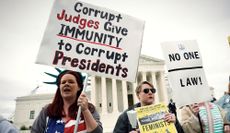
Speed Read Conservative justices signaled support for Trump's protection from criminal charges
By Peter Weber, The Week US Published 26 April 24

By Harold Maass, The Week US Published 25 April 24
- Contact Future's experts
- Terms and Conditions
- Privacy Policy
- Cookie Policy
- Advertise With Us
The Week is part of Future plc, an international media group and leading digital publisher. Visit our corporate site . © Future US, Inc. Full 7th Floor, 130 West 42nd Street, New York, NY 10036.
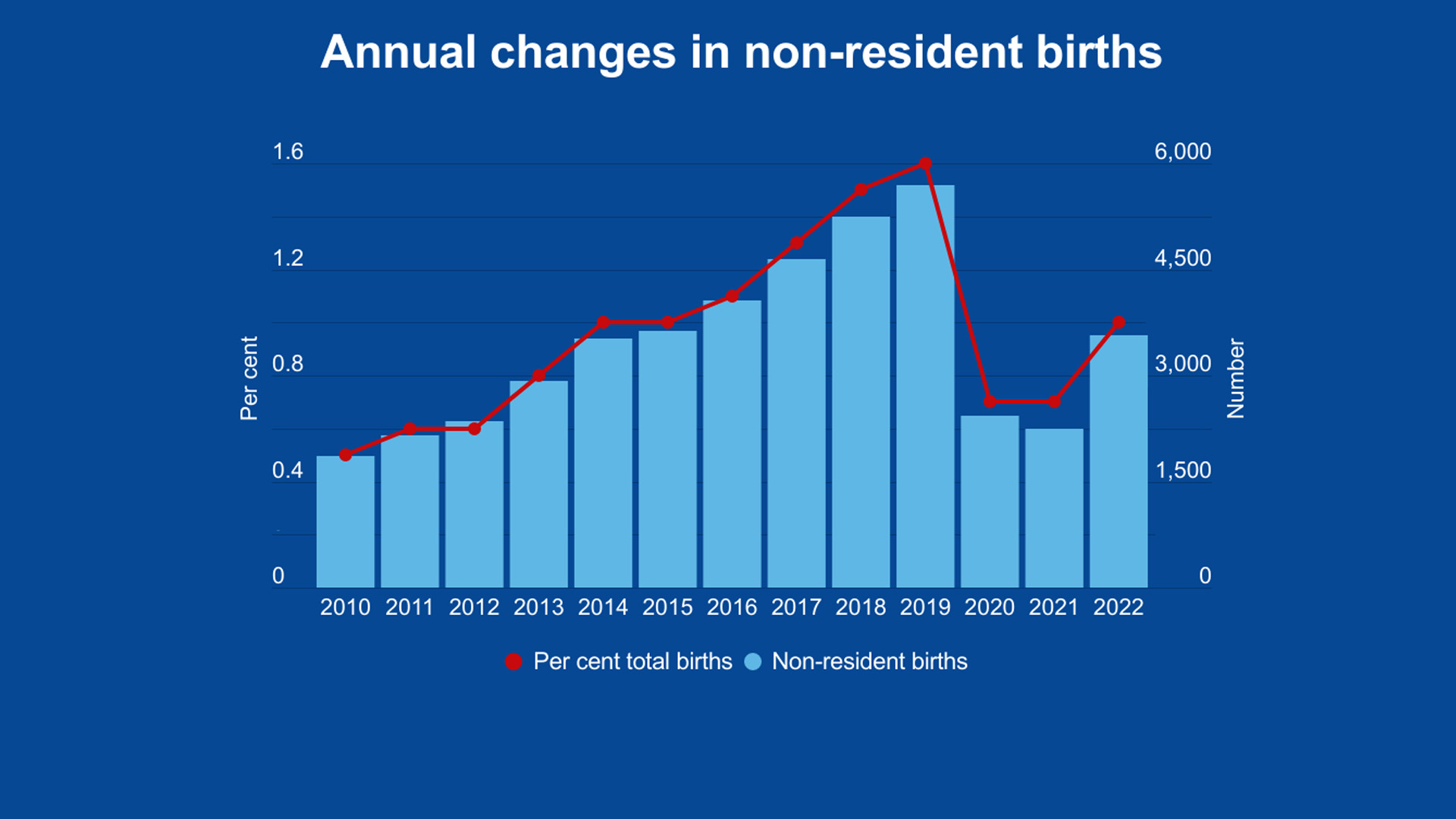
- Global Affairs
Birth tourism is rising again post-pandemic

The COVID-19 pandemic provided the perfect natural experiment to assess the extent of birth tourism in Canada.
Dramatic declines of 50 per cent compared with the pre-pandemic 2016-20 average occurred in 2020 and 2021 in the number of “non-resident, self-pay” births. That was followed by an overall increase of 53 per cent in 2022 compared with the 2020-21 average, although the 2022 figure is still far below the 2019 peak.
This partial return to growing numbers highlights the need for the government to make good on its 2018 commitment to get a better handle on the extent of birth tourism, and to go so far as to consider an amendment to the Citizenship Act.
Figure 1 captures the steady increase prior to the pandemic and the sharp fall thereafter. Last year’s increase to 3,575 non-resident births from the pandemic average of 2,339 occurred in all provinces.
Table 1 compares non-resident births in 2011-15 and 2016-20 with those in subsequent years. The increase over these five-year periods contrasts with the sharp decline in 2020-21 and the sharp reversal in 2021-22, both of which were particularly notable in British Columbia. Compared to the 2019 high, the number of non-resident births has rebounded to 63 per cent of pre-pandemic levels.
There is no comparable U.S. post-pandemic data because since January 2020, the U.S. no longer issues visas “for birth tourism (travel for the primary purpose of giving birth in the United States to obtain U.S. citizenship for their child).”
Because there is no health-specific code for women travelling to Canada on visitor visas for birth tourism, the broader non-resident self-pay code is used. However, this includes international students, about half of whom are covered by provincial health plans, and other temporary residents.
Overall visitor visas in 2022 largely rebounded to pre-pandemic levels. The number of temporary workers has increased significantly. However, this varies by country.
Overall visitor visas for Chinese nationals used to be one of the major groups for birth tourism, but they have fallen dramatically. Chinese government travel-related restrictions are likely a significant factor in the reduction in Chinese birth tourists.
The percentage of non-resident births fell from 1.6 per cent of total births in 2019 to 0.7 per cent in 2020 and 2021, but it rebounded to 1.0 per cent in 2022. About 50 per cent of non-resident births are estimated to be birth tourists.
Table 2 provides a view of the impact of COVID-19 on non-resident births for the 10 hospitals in Canada with larger percentages of non-resident births. Since the dramatic fall during the pandemic, non-resident births have increased in most hospitals.
British Columbia’s Richmond Hospital was once the epicentre of birth tourism with its supportive “cottage industry” of “birth hotels.” In 2019-20, non-resident mothers made up 24 per cent of its births. But it fell sharply in this category during the pandemic and has rebounded only to four per cent in 2022. It’s now fourth in the Top 10.
The new No. 1 and No. 2 are Toronto’s Humber River Hospital, with 10.5 per cent of all births being non-residents and Montreal’s St. Mary’s with 9.4 per cent. Humber River is also the only hospital that showed an overall increase compared to pre-pandemic period.
There is a need for more hospital-level studies such as the one in Calgary that found about one-quarter of non-resident women who gave birth in the city in 2019-20 were from Nigeria. The study also estimated the cost to Alberta taxpayers.
The development of links between Canadian immigration data (e.g., immigration program and category) and Canadian Institute for Health Information (CIHI) health data on medical services should allow for greater precision about the number of women giving birth while on visitor visas and those under other temporary resident categories.

Is birth tourism about to return now that travel restrictions have been lifted? Birth tourism in Canada dropped sharply once the pandemic began Hospital stats show birth tourism rising in major cities
Overall, the federal government has not followed up on its 2018 commitment to “better understand the extent of this practice as well as its impacts” following the first release of the non-resident self-pay numbers and related media attention. The 2021-22 decline understandably reduced political interest and pressure in addressing the issue.
Given current and planned increases in immigration, it is highly unlikely that the government will act because the number of non-resident births is basically a rounding error compared to overall immigration of 500,000 a year by 2025 .
However, as visitor visas largely reverted in 2022 to pre-pandemic levels, it is no surprise that non-resident births, including birth tourism, have increased. The government should resume work to clarify the issue. In particular, it should link immigration and health data to improve understanding of immigration and health issues, including birth tourism. As numbers of non-resident births can be expected to increase further, greater precision regarding the components of non-resident births would inform possible policy and program responses.
A 2019 Angus Reid survey found that 64 per cent of those Canadians surveyed would support a change in the law so that citizenship is not conferred on babies born here to parents on tourist visas.
Policy and operational questions remain about whether birth tourism warrants an amendment to the Citizenship Act , visa restrictions on women intending to give birth in Canada, or other administrative and regulatory measures to curtail the practice.
Visa restrictions would be difficult to administer and regional administrative and regulatory measures might encourage hospital and jurisdiction “shopping.”
So the cleanest approach would be an amendment to the Citizenship Act that would require one parent to be a citizen or permanent resident of Canada. That is the situation in Australia.
Should the Conservatives form a government after the next federal election, they may well decide to revisit the issue of birth tourism given that the Harper government pressed the issue in 2012 only to back off.
A note on methodology
The data is from the CIHI ’ s discharge abstract database, more specifically “ non-resident self-pay ” category in the responsible for funding program (RFP), as well as totals for hospital deliveries.
The overall RFP data includes temporary residents on visitor visas, international students, foreign workers and visiting Canadian citizens, and permanent residents. Quebec has a slightly different coding system, but CIHI ensures its data is comparable. Data for Quebec hospitals is not provided through CIHI and thus the larger Montreal area hospitals were approached directly.
Ottawa-area hospitals were not included given the number of diplomatic families likely being a substantial portion of non-resident births. Declines in non-resident births at Trillium-Credit Valley Hospital in Mississauga, Ont., led to that hospital falling off the Top 10 list.
Health coverage for international students varies by province, but most of them are covered by provincial health plans. This is not the case in Manitoba and Ontario, as well as for some students in Quebec if their country of origin does not have a social-security agreement with Quebec. The pre-pandemic baseline is the five-year average 2016-20.
Mackenzie Health ’ s woman and child program moved from Mackenzie Richmond Hill Hospital to Cortellucci Vaughan Hospital when it opened to the community in June 2021 .
You are welcome to republish this Policy Options article online or in print periodicals, under a Creative Commons/No Derivatives licence.
Republish this article
by Policy Options . Originally published on Policy Options December 14, 2023
This <a target="_blank" href="https://policyoptions.irpp.org/magazines/december-2023/birth-tourism-is-on-the-rise-again/">article</a> first appeared on <a target="_blank" href="https://policyoptions.irpp.org">Policy Options</a> and is republished here under a Creative Commons license.<img id="republication-tracker-tool-source" src="https://policyoptions.irpp.org/?republication-pixel=true&post=109994&ga4=G-GR919H3LRJ" style="width:1px;height:1px;">

This work is licensed under a Creative Commons Attribution-NoDerivatives 4.0 International License .
Related stories

An improved civic education will help sustain our democracy

- Immigration
- Policy-making
Visible minorities have difficulty accessing the labour market
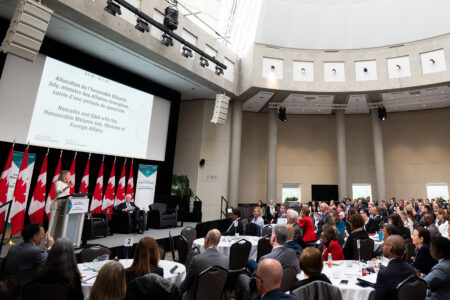
- National security
Canadian diplomacy needs to find its way back from the wilderness
Why birth tourism from China persists even as U.S. officials crack down
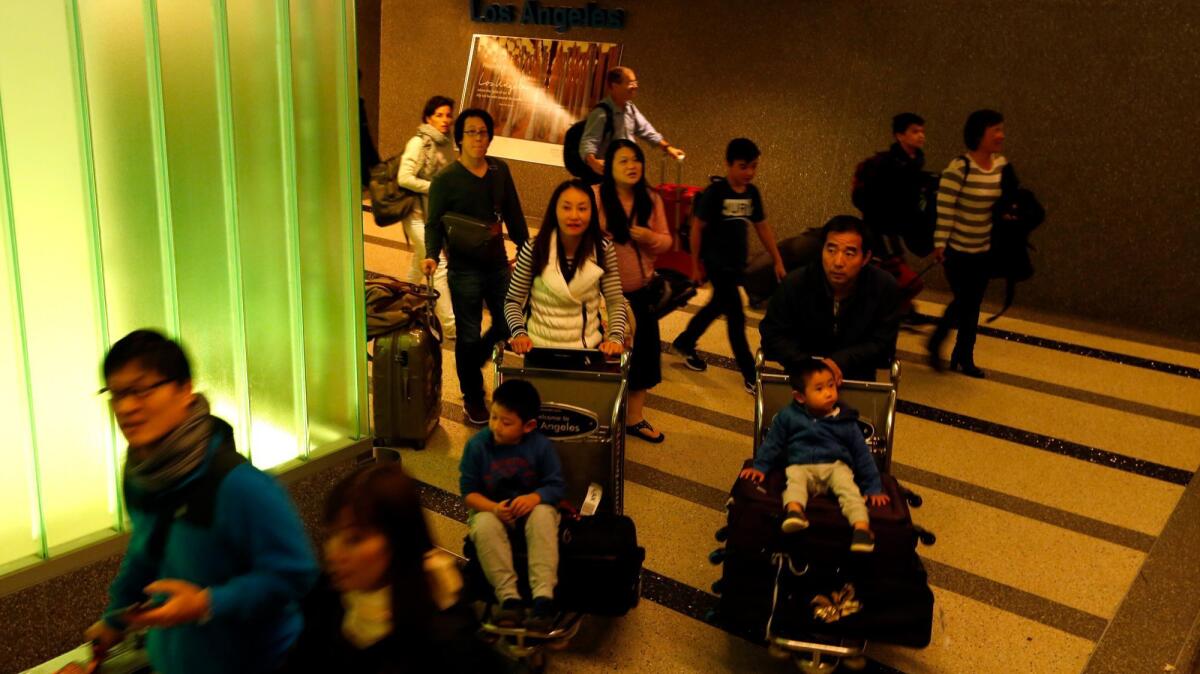
- Show more sharing options
- Copy Link URL Copied!
At 10 a.m. on a cold morning in April at Whittier Medical Center, Sophia was born.
She was a healthy baby girl at 7 pounds and 1 ounce, with a future in America to look forward to, if she chose it.
Her mother, Tracy, came from Shanghai to give her this choice — a chance at the world’s best education, a safe childhood and reliable medical care without long lines.
“I’m here to give my kids better options,” said Tracy, who asked to be referred to by her first name because she has read stories about U.S. officials cracking down on mothers who come to America to give birth.
Even as middle class incomes in China enjoy explosive growth, and 96% of Chinese people in a recent Pew Research poll say their lives are better than their parents’, an unknown number of “birth tourists” like Tracy cross oceans each year to have their babies in America.
And in America’s Chinese enclaves, they find a cottage industry of Chinese midwives, drivers and doctors who accept cash and “maternity hotels” — apartments or homes run as hotels for the women during their pregnancies.
There is nothing in the law that makes it illegal for pregnant women to enter the United States.
— Virginia Kice, ICE spokeswoman
Chinese listing sites show several hundred maternity hotels in Southern California, though it’s not clear how many of the listings are active.
Anyone who lies about the purpose of their visit to the U.S. can be charged with visa fraud, but birth tourism per se is not illegal.
“There is nothing in the law that makes it illegal for pregnant women to enter the United States,” said Virginia Kice, a spokeswoman for U.S. Immigration and Customs Enforcement.
Critics , however, blast the practice as a way to gain citizenship for children by unfairly gaming the immigration system. And spurred in part by those complaints, U.S. officials at every level are exploring ways to crack down on maternity hotels.
That the practice persists, birth tourists say, is a testament to the hold that America still has on Chinese imaginations.
Restrictive family planning policies may have driven some Chinese mothers to give birth in America before 2015, when the one-child policy ended. But many others are simply curious about America and exploring the possibility of a life in the U.S., said Kelly, a birth tourist who has settled in Riverside County’s Eastvale neighborhood.
“China has developed very quickly,” said Kelly, who also declined to provide her first name. “But … Chinese people still have this perception of America as a dream place to live, that it is bigger, better, stronger.”
In 2015, the State Department issued 2.27 million visas to Chinese tourists. It does not track what proportion of visas are issued to birth tourists. Childbirth is a legitimate reason to travel to the U.S., and as long as Chinese nationals provide the correct paperwork and evidence they can pay for their medical care, they will be issued a visa, department officials said.
Chinese people still have this perception of America as a dream place to live, that it is bigger, better stronger.
— “Kelly,” a Chinese birth tourist
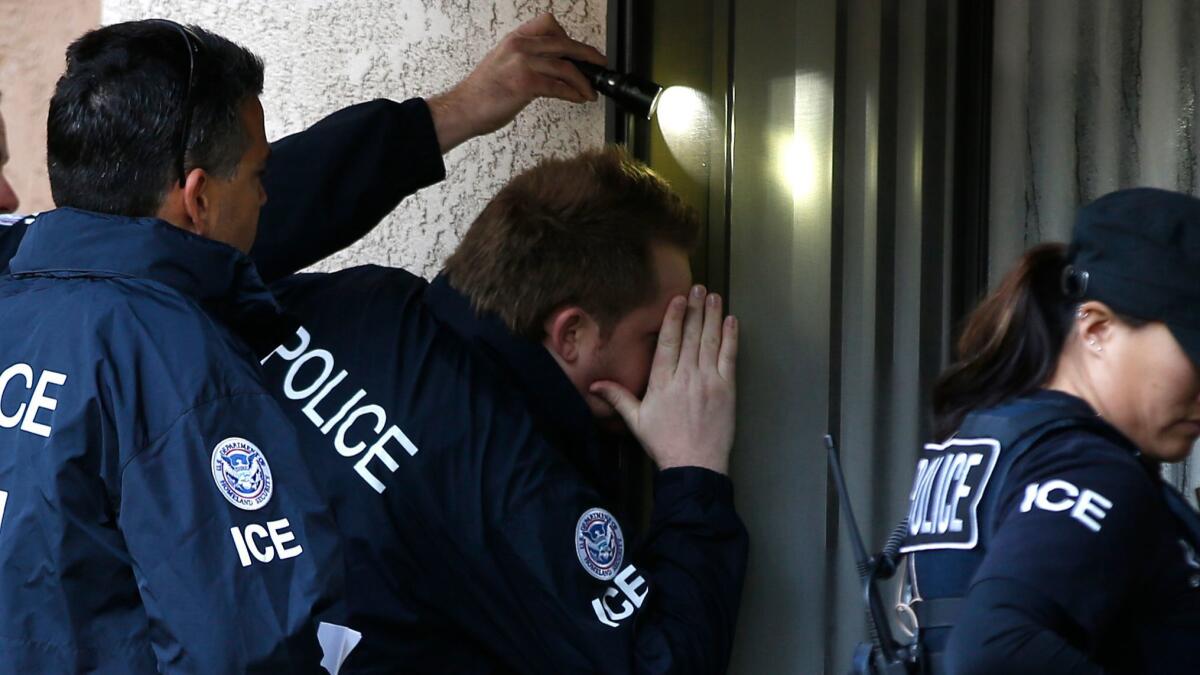
But other federal officials have handled the issue differently, acting on suspicions that the practice involves large-scale visa fraud. Border Patrol agents at major ports of entry such as Los Angeles International Airport have recently tightened security for pregnant Chinese women and sometimes block them from entering the country.
And last year, ICE officials raided birth hotels in Riverside, Rowland Heights and Irvine, accusing the operators of tax code violations and of committing fraud by helping birth tourists get visas under false pretenses.
“People who provide false information in order to gain entry to the U.S. pose a potential security vulnerability,” Kice said.
In the San Gabriel Valley, where birth hotels are an open secret, local leaders field a steady stream of complaints from area residents who oppose maternity hotels. In Chino Hills, a group of residents protested the presence of birth hotels in the neighborhood, and Arcadia police even assigned a detective to investigate the businessesin response to residents’ complaints.
In 2013, Los Angeles County formed a birth tourism task force to tackle the issue. The task force has identified and cited 34 birthing hotel operators for running businesses on land that is zoned for residential use. But there is still no county regulation against running hotels for foreign nationals traveling to the U.S. for the sole purpose of giving birth.
The same year that authorities cracked down on birth tourism, “Finding Mr. Right,” a dramatization of a Chinese mother’s trip to Seattle to give birth, grossed $82 million in China, the ninth-highest-earning domestic film that year.
The film wraps the controversy of birth tourism in the familiar narrative confines of a sugary romantic comedy, telling the story of a Beijing tycoon’s wife who flies to Seattle to give birth and falls in love with a driver at the maternity hotel.
One of the first scenes shows her preparing to navigate customs by wrapping a loose cloth around her pregnant belly. At customs, she tells the officer that she’s here to “travel.” When he asks if she’s married, she responds by performing Beyonce’s “Single Ladies” dance.
Rosy depictions of the U.S. in that film and others fuel the American dreams of the growing Chinese middle class. And a deteriorating belief in China’s future drives still others to consider giving birth in America.
Food safety, pollution and income inequality are now among Chinese citizens’ top concerns, according to Pew Research. Just 6% of high-net-worth Chinese individuals say they plan to remain in China full time, according to a Hurun Report poll in 2015, and the U.S. is their top destination.
Authorities say it’s virtually impossible to tell how many Chinese birth tourists come to the U.S. each year. The Center for Immigration Studies, a conservative-leaning think tank, estimates that nearly 36,000 Chinese nationals give birth in the U.S. each year, but “that’s just a guess,” said Jessica Vaughan, the center’s executive director.
Birth tourists are using U.S. citizenship as a safety net, Vaughan said. And they can use welfare and healthcare benefits that they did not pay taxes for. She thinks the government should make it harder for babies born from birth tourism to retain their citizenship by requiring them to spend the first five years of their lives in the U.S., rather than allowing families to take the babies back to their homeland.
“Birth tourism commodifies U.S. citizenship rather than keeping it something that is earned through the legal immigration system. It cheapens citizenship in the eyes of native-born Americans,” Vaughan said.
Karin Wang, a vice president at Asian Americans Advancing Justice, says she is concerned that such attitudes toward birth tourism reflect xenophobia and anti-Asian sentiment. She cast birth tourism as the side effect of a broken immigration system.
“If the immigration system itself worked better, then these convoluted paths that people take to secure status in America would lessen or disappear,” Wang said.
Birth mothers often arrive in the U.S. a few months before they’re set to have their babies because their pregnancies aren’t as visible then, and they’ve heard that officials block pregnant women from entering the country.
Many mothers stay in the U.S. at least long enough to observe the Chinese custom of zuo yuezi, a month-long regimen and diet that is supposed to promote health among new mothers.
Birth tourism commodifies U.S. citizenship rather than keeping it something that is earned through the legal immigration system.
— Jessica Vaughan, director of the Center for Immigration Studies
Before and after the birth, the mothers, who are sometimes joined by their husbands, fight boredom in the suburban communities around Los Angeles where the hotels are often located.
On a recent weekday in Rowland Heights, a block from the birth hotels raided by immigration officials last year, Target was having a 50%-off sale on baby clothes and items. Pregnant Chinese mothers packed the aisles.
Tracy settled into a chair at the Starbucks in the Target, wrapped a jacket around Sophia, installed a toy in her chubby fists, then warmed her hands on a cappuccino.
For better or worse, Chinese mothers’ first impression of American life is often in places like Rowland Heights, a mostly-Asian sprawling suburb of homes and vast strip malls 25 miles east of downtown Los Angeles.
Birth tourism is the neighborhood’s incognito economic engine — dozens of pregnant Chinese women visit these shopping centers each day, walking from nearby maternity facilities or transported by cars the hotel operators provide. There’s OshKosh B’gosh, Babies R Us, Ibiya Family, mattress and crib stores, doctors, dentists and Chinese banks.
Life in America tempts from the strip malls. Among the baby stores, there are home loans on offer, car rentals to go see the homes, real estate agents to guide shoppers and immigration attorneys to handle paperwork.
Many mothers, like Tracy, consider staying. Her reasons have more to do with China’s flaws than U.S. freedoms.
In Shanghai, she says, the buildings are tall and modern, but the rent is high. The skyline is beautiful, but the air isn’t clean and the food isn’t safe. The airport is architecturally impressive but inconvenient.The people speak her language, but they are always judging and comparing, evaluating the clothes she wears, the home and neighborhood she lives in, the school her children will attend. A life in America is a break from all of that.
“Here people are not so competitive, trying to wear better clothes and use better things,” Tracy said. “I don’t even have to wear makeup.”
Later in the afternoon, two pregnant Chinese women wandered into the Starbucks at the Target with a pint of Haagen-Dazs each, searching for spoons
They couldn’t speak English, and the employees behind the counter were busy with a long line of customers. They settled for wooden stirrers, poking away small dabs of ice cream at a time, laughing at each other’s failed attempts.
The women are birth tourists from China who met in Los Angeles. Zhu is not married yet, and she’s not sure when she will be or if she wants to stay in the U.S. But she flew from Guangdong to have her baby because she says she has no other choice.
She says she’s fleeing family-planning regulations that fall particularly hard on single mothers in China. To have a baby, the government must issue a reproduction permit, and single women have had trouble getting them. In Wuhan, China two years ago, authorities even considered fining single pregnant women 80,000 yuan.
Rowland Heights, along with Arcadia and Irvine, have long been plagued with rumors that the communities host “mistress villages” — a slang term in China to describe a housing complex where rich Chinese men house their mistresses.
The rumors are unverifiable, but birth tourists, birth hotel operators, nurses and other people working in the industry told The Times that Chinese single women form a significant part of the birth tourism industry.
A baby without the proper permits can’t access public services like school or healthcare, Zhu said. And mothers giving birth out of wedlock face withering social persecution.
So a few months ago, she came to the U.S. alone to give birth. It was her unborn child’s only chance at a future, she said.
Green fields, tall trees, modern cities, stylish people and nothing to worry about — those are the things Kelly expected before she came to America to have her baby.
What she found was something slightly different: a big empty home in Eastvale, with nothing but suburbia to see for miles in every direction but the occasional strip mall and the San Gabriel Mountains.
Still, they own their home, something they could have never afforded in Zhejiang. And her husband, who works in the pharmaceutical industry, has found better career opportunities than he ever could have in China.
“As a young person in China, you walk slowly upwards, unless you have an uncle in the right place,” Kelly said.
Eventually she plans to go back to work. But for now her life consists of trips to the nearby library, walks to the park and time spent in the living room of their home, where on a recent weekday, she tries to steer some noodles into the mouth of her 7-month-old son.
For the time being, they plan to stay.
“We haven’t really decided that we want to be American, but we like America,” Kelly said.
Twitter: @frankshyong
For Asian Americans, 2016 election is shaping up to be a turning point
Southland’s new wave of Chinese restaurants are about a lot more than takeout
When Trump says he wants to deport criminals, he means something starkly different than Obama
More to Read
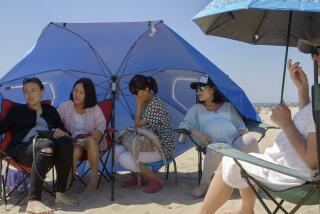
Column: Chinese birth tourism documentary pulls back the curtain on a controversial industry
Jan. 26, 2024
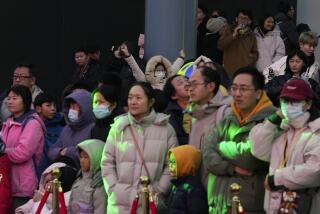

China’s population falls for a second year in a row as COVID restrictions end
Jan. 17, 2024
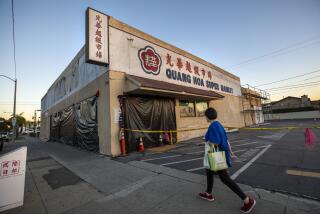
Column: Once flush with Chinese tourism dollars, San Gabriel Valley searches for a new normal
Nov. 10, 2023
Start your day right
Sign up for Essential California for news, features and recommendations from the L.A. Times and beyond in your inbox six days a week.
You may occasionally receive promotional content from the Los Angeles Times.

Frank Shyong is a columnist for the Los Angeles Times writing about diversity and diaspora in Los Angeles.
More From the Los Angeles Times

Police remove tents, clear USC pro-Palestinian encampment, but no arrests made

Metal detectors, fear, frustration. College commencements altered amid Gaza war protests
May 5, 2024

Climate & Environment
How humanity’s ear-splitting racket deafens whales and other marine animals
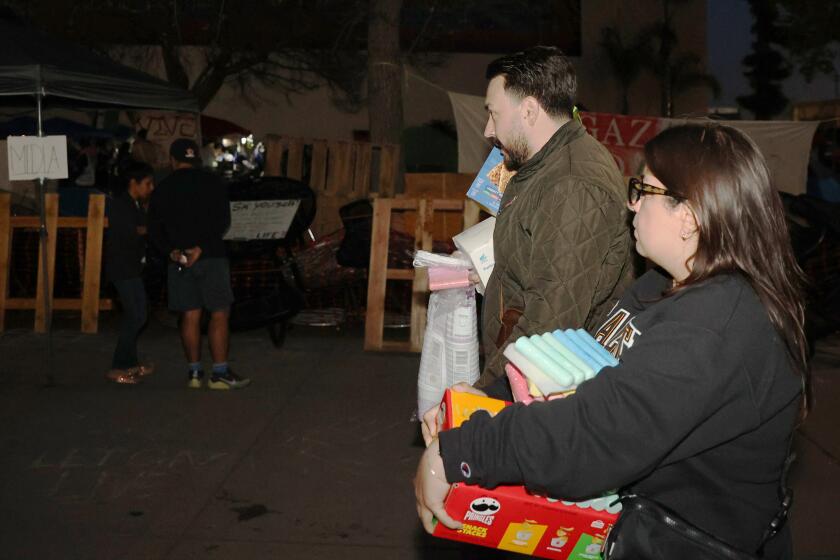
Column: Pringles, plywood and chalk: The supply chain sustaining the Cal State L.A. encampment
Born In The USA: Why Chinese 'Birth Tourism' Is Booming In California

Former China Correspondent, The WorldPost
BEIJING -- When Ma Fahong approached the immigration desk at Los Angeles International Airport, the customs agent had only two questions for her.
“Why are you coming to the U.S.?”
“I’m here to have a baby.”
“How much cash do you have on you?”
“I only have $1,000 in cash, but I have a debit card with much more in the bank.”
Passport stamped. Welcome to Los Angeles.
Ma is part of a growing wave of Chinese women who are flocking to the United States -- California, in particular -- to have children who will grow up as American citizens. The 14th Amendment to the U.S. Constitution guarantees citizenship to every person born on American soil, a fact that has long motivated foreigners from all over the world to give birth in the U.S.
The conversation about immigrant families in the U.S. is typically centered around people from Latin America seeking economic opportunities in the States. But as incomes in China rise and visa hurdles fall, women from China are making up a larger share of foreign births in the U.S, and they’re complicating many of the popular ideas about immigrant mothers.
Most of the Chinese mothers come with large sums of cash at their fingertips, money they often spend on houses and luxury goods . While many, like Ma, enter and give birth in the U.S. legally, others buy package plans from “birth tourism” agencies -- profit-seeking and sometimes illegal organizations that arrange accommodations and hospital visits for groups of Chinese women. These businesses have clustered in California, a top tourism destination that also boasts large Chinese-American communities that make many expectant mothers feel at home.
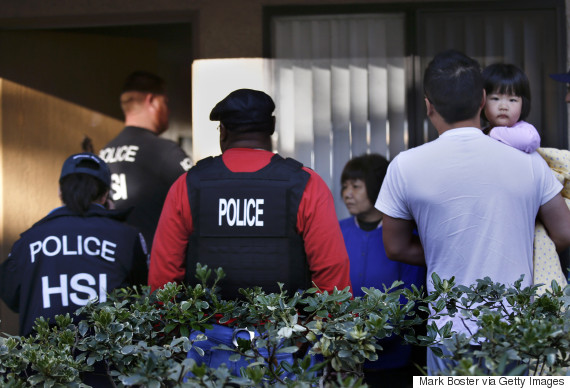
In March, federal agents raided several “maternity hotels” in the Los Angeles area. Undercover investigations had revealed that the groups were evading taxes, encouraging women to lie to immigration officials and sometimes defrauding hospitals .
No reliable data exists on the number of Chinese births in the U.S, but estimates by industry publications projected a total of 60,000 for 2014, a sixfold increase over 2012. Awareness of the trend skyrocketed in China in 2013 when the popular romantic comedy “ Finding Mr. Right ” portrayed a Chinese woman, the mistress of a wealthy businessman, sneaking into Seattle on a tourist visa in order to buy Gucci bags and have an American child.
That film popularized and sensationalized the phenomenon, but Ma and her husband, Zhu Yuesheng, are much more low-key. Born near the dawn of Chinese economic reforms in the late 1970s, Ma and Zhu left behind the farms their parents tilled in order to attend college. Riding China’s economic boom, the couple sought work in the southern manufacturing powerhouse of Guangdong province, eventually starting their own factory that produces computer handbags.
When the couple had their first child a decade ago, legally giving birth in the U.S. was only an option for the wealthiest and most cosmopolitan Chinese couples. But over the past 10 years, visas to the U.S. have become easier to get for Chinese nationals, and the country's per capita GDP has more than doubled .
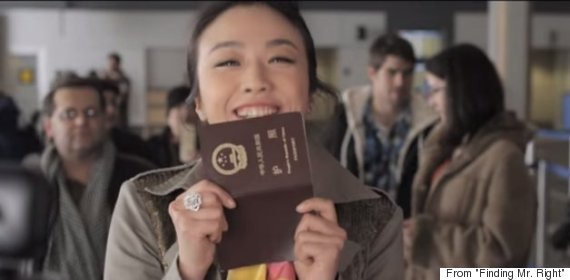
In that same span of time, China has also been plagued by health scandals that have struck fear into expectant mothers. Food safety scares -- including tainted infant milk powder -- often dominate the news, and the public has woken up to the dangers of the toxic smog engulfing many Chinese cities. One recent study linked high levels of air pollution to lower birth weights that put babies at risk in their first month and later in life.
But foremost in many Chinese parents’ minds are the educational opportunities available in the U.S. Weary of their country’s test-obsessed education system, record numbers of Chinese parents have been sending their children to American kindergartens, Ph.D. programs and everything in between. An American passport makes many of these opportunities cheaper and more accessible.
Having a child in California is not cheap for Chinese parents: Package deals at maternity hotels often start at $20,000 and go much higher. Ma and Zhu chose to rent a room from a friend in Long Beach, but they still estimate that they spent around $30,000 in total.
But even those high outlays essentially pay for themselves in many cases. If Ma and Zhu had given birth to their second child in China, they likely would have faced fines equal to $40,000 for violation of the country’s “one-child policy.”
Zhu first traveled to the U.S. in 2008 for a trade show in Las Vegas. (His initial impressions of America: “Dry and lots of gambling.”) It was through the international sales of his factory’s handbags that he and his wife first met Cora Callanta and her husband, who would eventually host them during their stay in Los Angeles.
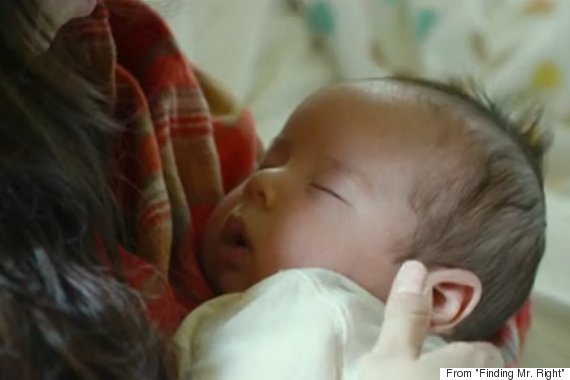
Callanta is an immigrant herself, having followed her mother to the U.S. from the Philippines as a teenager. Her mother worked hard to support nine children, and that experience shaped how Callanta views Ma and another Chinese woman who stayed with their family while giving birth.
“[My mother] instilled in our minds that you are not to go on welfare. You’ve got to work hard and support yourself, and you don’t depend on the government for anything,” Callanta told The WorldPost. “I see the two Chinese families that I’ve crossed paths with and they’re the same way. They’re not taking advantage of the system.”
But not all observers are so sanguine about the trend. Sen. David Vitter (R-La.), who has called the phenomenon “ nuts ,” is one of several senators to introduce legislation that would end birthright citizenship. Jon Feere of the Center for Immigration Studies has testified before Congress, arguing that “birth tourism” represents a major abuse of immigration law.
“One of the key problems with birth tourism is that that birth tourists are effectively taking control over U.S. immigration and citizenship policy by turning a grant of temporary admission into a permanent stay,” Feere told The WorldPost in an email. “And they're doing it through fraud, lying to our officials.”
Federal investigations in Los Angeles found that many of the maternity hotels didn’t pay taxes on millions of dollars in income, and that employees had coached expectant mothers on how to hide their true intentions from visa and immigration officials.
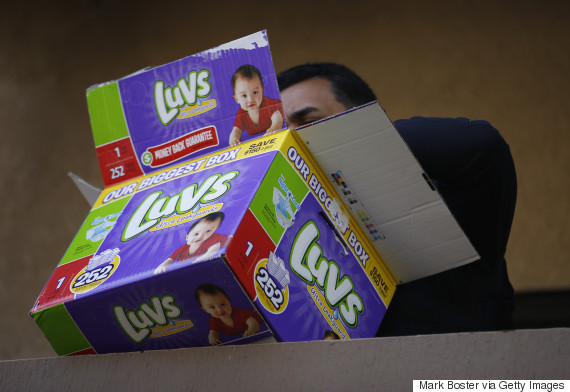
Agents also discovered evidence of agencies or mothers defrauding hospitals , sometimes by relying on discounts for impoverished mothers. One family that paid just a small fraction of its $28,845 hospital bill was found to have purchases at Louis Vuitton and Rolex on its bank statement.
For the time being, the federal raids may have slowed the influx of Chinese visitors. One consultant who arranges birth tourism trips told The New York Times' Chinese edition that business has dropped 30 percent over the past month.
But in interviews, several Chinese parents remained optimistic about their children’s bicultural futures. Zhu and Ma hope to send both of their children to a private school in Los Angeles beginning in either elementary or middle school, and the couple wants to travel between China and California until they’re too old to make the trip.
Asked if their American-born son would grow up feeling Chinese or American, Zhu told The WorldPost, “I hope he can balance both.”
Our 2024 Coverage Needs You
It's another trump-biden showdown — and we need your help, the future of democracy is at stake, your loyalty means the world to us.
As Americans head to the polls in 2024, the very future of our country is at stake. At HuffPost, we believe that a free press is critical to creating well-informed voters. That's why our journalism is free for everyone, even though other newsrooms retreat behind expensive paywalls.
Our journalists will continue to cover the twists and turns during this historic presidential election. With your help, we'll bring you hard-hitting investigations, well-researched analysis and timely takes you can't find elsewhere. Reporting in this current political climate is a responsibility we do not take lightly, and we thank you for your support.
Contribute as little as $2 to keep our news free for all.
Can't afford to donate? Support HuffPost by creating a free account and log in while you read.
The 2024 election is heating up, and women's rights, health care, voting rights, and the very future of democracy are all at stake. Donald Trump will face Joe Biden in the most consequential vote of our time. And HuffPost will be there, covering every twist and turn. America's future hangs in the balance. Would you consider contributing to support our journalism and keep it free for all during this critical season?
HuffPost believes news should be accessible to everyone, regardless of their ability to pay for it. We rely on readers like you to help fund our work. Any contribution you can make — even as little as $2 — goes directly toward supporting the impactful journalism that we will continue to produce this year. Thank you for being part of our story.
It's official: Donald Trump will face Joe Biden this fall in the presidential election. As we face the most consequential presidential election of our time, HuffPost is committed to bringing you up-to-date, accurate news about the 2024 race. While other outlets have retreated behind paywalls, you can trust our news will stay free.
But we can't do it without your help. Reader funding is one of the key ways we support our newsroom. Would you consider making a donation to help fund our news during this critical time? Your contributions are vital to supporting a free press.
Contribute as little as $2 to keep our journalism free and accessible to all.
Dear HuffPost Reader
Thank you for your past contribution to HuffPost. We are sincerely grateful for readers like you who help us ensure that we can keep our journalism free for everyone.
The stakes are high this year, and our 2024 coverage could use continued support. Would you consider becoming a regular HuffPost contributor?
The stakes are high this year, and our 2024 coverage could use continued support. If circumstances have changed since you last contributed, we hope you'll consider contributing to HuffPost once more.
Already contributed? Log in to hide these messages.
Popular in the Community
From our partner, more in the world post.
- 80° Partly Cloudy

Anchor babies, birth tourism cause debate, discussion
- Pacific Daily News Catherine Bejerana Camacho, For Pacific Daily News USA TODAY Network
- Feb 4, 2020
- Copy article link
Mabuhay and hafa adai. The 14th Amendment of the U.S. Constitution provides that “all persons born … in the United States, and subject to the jurisdiction thereof, are citizens of the United States.”
In recent years, this amendment has been the subject of discussion and debate because of two main issues.
The first issue is with respect to "anchor citizens" or "anchor babies." These terms describe someone born in the United States to a citizen of another country who is in the U.S. illegally, and who uses U.S. citizenship to legitimize his or her parent’s immigration status. Because the 14th Amendment confers a child born in the United States with U.S. citizenship, he or she can legitimize or petition his or her parents after turning 21.
Those who believe that anchor citizenship shouldn’t be allowed argue that being born in the United States should not automatically equate to U.S. citizenship, especially if your parents are in the United States illegally. They further argue anchor citizenship promotes illegal immigration.
As of the date this article was written, no new rule or regulation has been adopted to address an anchor citizen or an anchor baby.
The second issue is with respect to “birth tourism,” or entering the United States for the primary purpose of giving birth in the United States so that the newborn will be a U.S. citizen. On Jan. 24, the Department of State issued a new rule prohibiting birth tourism.
The new rule does not change the Department of Homeland Security’s regulations with respect to the admissibility of aliens and the Visa Waiver Program travelers. The new rule, however, “explicitly establishes that birth tourism is not a permissible purpose for issuance of a B visa.”
According to the Department of State, thousands of children are born annually from mothers who enter the United States on a B-1/B-2 visa. This creates a national security problem, especially if the foreign national mother comes from a country that desires to exploit birth tourism.
Additionally, birth tourism operators and companies that arrange a package deal for a woman to give birth in the United States have wrongly profited from the scheme. One operator apparently charged $100,000 for services.
Additionally, birth tourism also places a strain on the United States health care system when the mothers who give birth fail to pay the full amount for their medical services.
One example cited by the Department of State is a couple who paid the indigent rate of $4,080 for a hospital bill that exceeded $28,000, notwithstanding the fact that this couple had over $200,000 deposited in their United States bank account and spent on luxury items while in the United States.
On Guam, we have seen past crackdowns on package deals that promote a non-immigrant pregnant woman’s short visit on Guam for the sole purpose of giving birth to a U.S. citizen child.
Although most of these individuals know that they will be unable to extend their stay in the United States by virtue of their child’s birth in American soil, some of these individuals see the move as a long-term investment in their future as well as their child’s future. The new rule will certainly have an impact on these package deals.
Your individual case may contain facts that may potentially change the outcome of your case. A consultation with an experienced immigration attorney will provide you with a more comprehensive assessment of your case.
Catherine Bejerana Camacho is a Filipino-American attorney raised on Guam and licensed to practice in Guam and California. She specializes in employment and family-based immigration law, corporate law and family law.
This article originally appeared on Pacific Daily News: Anchor babies, birth tourism cause debate, discussion
- Immigration Debate
- Constitutional Amendments
- Citizenship
- U.s. Department Of State
Post a comment as anonymous
- [whistling]
- [tongue_smile]
- [thumbdown]
- [happybirthday]
Your comment has been submitted.
There was a problem reporting this.
Watch this discussion. Stop watching this discussion.
(0) comments, welcome to the discussion..
Keep it Clean. Please avoid obscene, vulgar, lewd, racist or sexually-oriented language. PLEASE TURN OFF YOUR CAPS LOCK. Don't Threaten. Threats of harming another person will not be tolerated. Be Truthful. Don't knowingly lie about anyone or anything. Be Nice. No racism, sexism or any sort of -ism that is degrading to another person. Be Proactive. Use the 'Report' link on each comment to let us know of abusive posts. Share with Us. We'd love to hear eyewitness accounts, the history behind an article.
Latest e-Edition
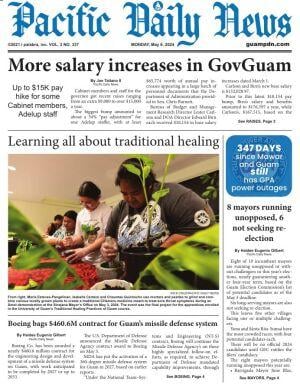
Pacific Daily News
- To view our latest e-Edition, click the image on the left.
Video Updates
Senior citizens advised to be wary of scams
- May 3, 2024
Trending Now
Police chase stolen truck from mangilao to sånta rita-sumai, suspect found a day later, gpd: 14-year-old girl shot in maite, two vehicles being sought, update: naval base guam main gate reopens after investigation, 'i told you, you should have let me out': woman accused of dwi, damaging jail cell, complaint: man flees from police twice, later apprehended, local events.

Birth Tourism: Benefits of Giving Birth Abroad & Birthright Citizenships
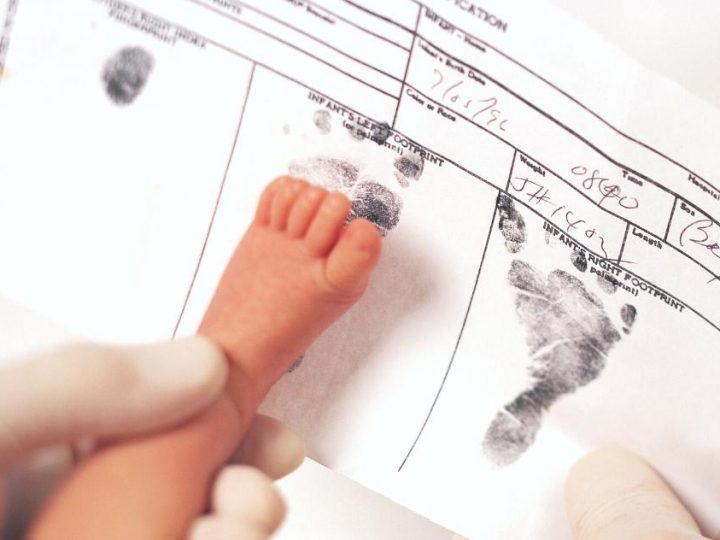
“I guess your kids won’t be US presidents” is what I often hear from people when they find out that neither of my children was born in the US. I usually smile, because surely they won’t be the next president, but instead, they’ll get a lot more benefits in their adult lives than American kids born in the US.
There are a number of ways to get second citizenship and passport: marriage, investment, or years of waiting. However, many forget about an easy one: having a baby in a foreign country.
Parents have a unique opportunity to choose the best country to give birth and give a child another passport. In fact, some countries will even grant the parents (or even grandparents) citizenship as well.
l’ll tell you how and where you can take advantage of birthright citizenship. In fact, I have first-hand experience doing it myself 🙂
Which Countries Have a Birthright?
When it comes to determining a child’s citizenship at birth, countries usually apply one of two rights: jus soli or jus sanguinis .
Jus soli , also known as birthright, grants citizenship merely on the basis of being born “on the soil” of the country in question. There are obviously special circumstances like Armed Forces territories, Embassy grounds, or no man’s lands, but the rule is fairly simple.
Jus sanguinis determines the child’s citizenship based on the parents’ nationality. Not all nationalities can be transmitted to children easily or automatically – for example, if you’re a US citizen but only lived in the US as a child and then left your kids aren’t eligible for US citizenship automatically (see the rules for CRBA ).
The most common example of birthright is obviously the United States. Many people enter the US to give birth to a child who automatically becomes an American citizen as they’re born on US soil.
While the parents aren’t eligible to stay and get residency in the US, the child could return when they’re 18 years old and sponsor the relatives for a green card when they turn 21. Naturally, it involves a lot of money and paperwork and it’s not an easy process when the “anchor child” has no connections in the US, but entirely legally possible.
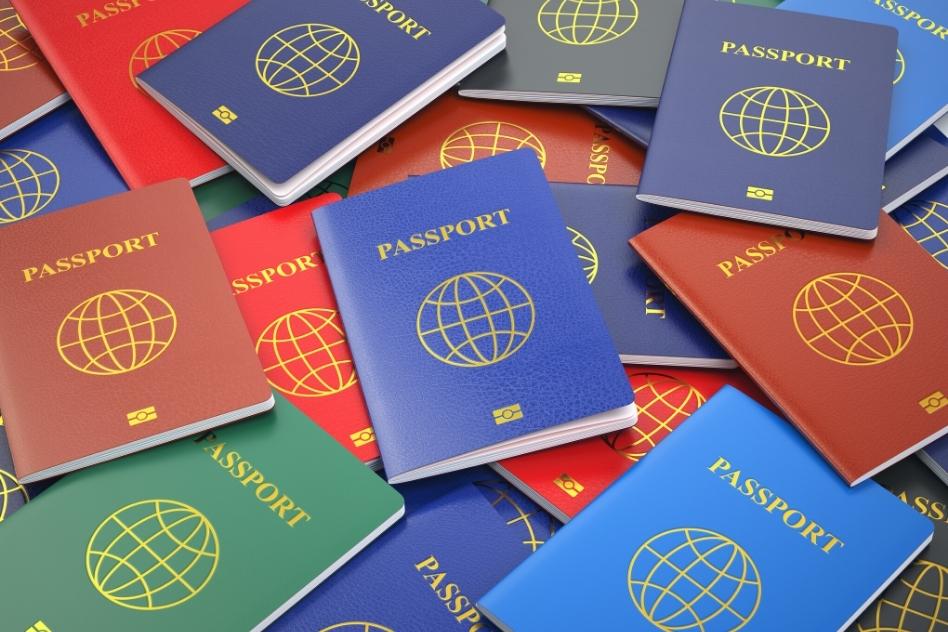
Why Take Advantage of Birthright?
Cost is something that many people think about first, as it’s undeniably cheaper to pay for the hospital birth anywhere outside of the US and get better care. After all… the US has a terrible rate of maternal deaths, especially in some states and people of color.
My personal reasons were that my child can invest in a property in the country without having to lease and jump through hoops and if everything falls apart we all can get citizenships as well. On top of better medical care and lower costs.
Something many Americans or people who push for kids to get American citizenship don’t think about is taxation. Becoming American citizen ties you with the tax system forever, unless you renounce your citizenship for which you need to pay for. It can also screw you when it comes to starting a life elsewhere. How come?
Many non-US banks are wary of doing business with US citizens due to the increased reporting requirements imposed by FATCA and the risk of penalties that apply if those banks fail to comply with the requirements of the Act (and their associated inter-governmental agreements).
In fact, many foreign banks are refusing to do business with US citizens because the risks and costs outweigh the benefits.
It really sucks if you can’t get a home loan (and for example, European mortgage rates can be below 1% which is a huge gain compared to the US) or an investment or even a basic bank account to receive your salary and pay your bills or whatever.
With the advent and proliferation of FATCA, having a non-US place of birth becomes even more valuable. Even if you have a second passport, a US place of birth gives away the fact that you’re a US citizen no matter what, unless you can produce a renunciation certificate.
However, with a non-US place of birth on a non-US passport, there’s nothing advertising one’s US citizenship. If I show up with my kids to Italy tomorrow with my European passport no one would suspect me or my kids of having any ties to the US since they were born in other countries.
You might need to disclose this information, but you can surely fly under the radar that way.
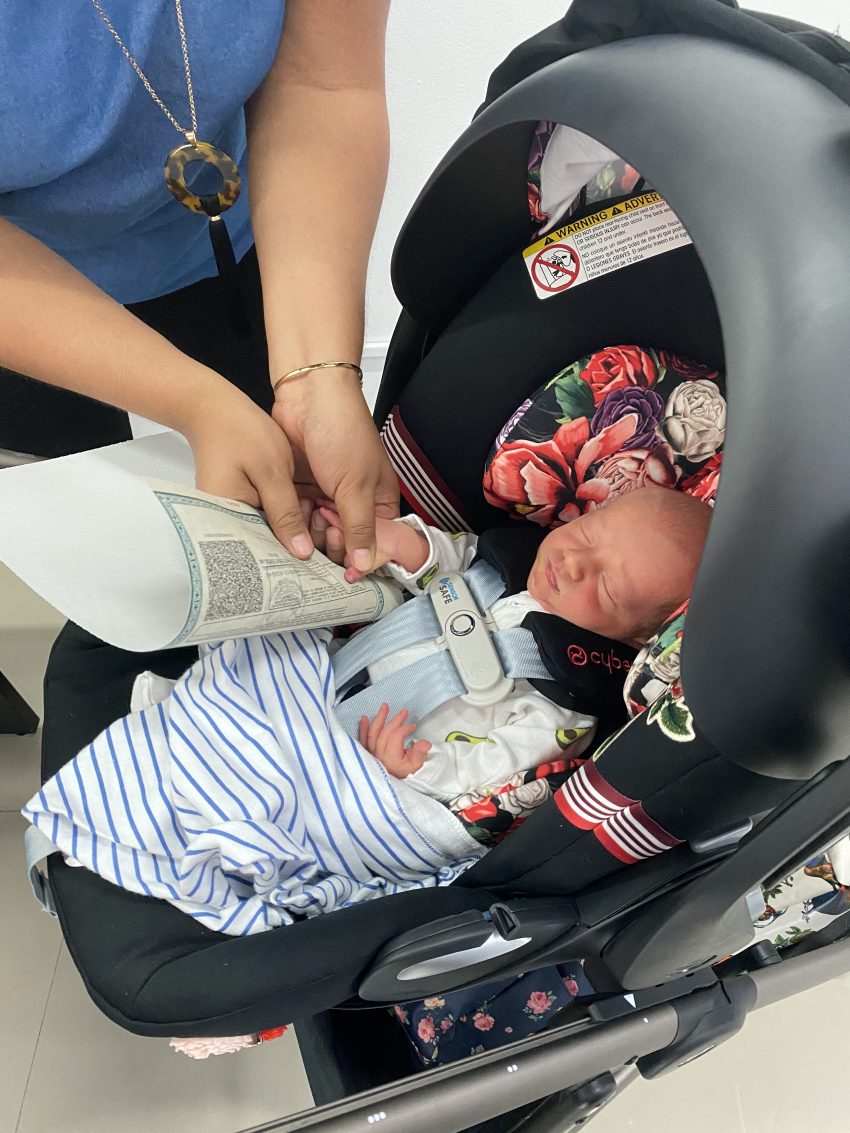
What Countries Offer Birthright Citizenship?
Thinking of having a baby soon? Some countries allow unrestricted jus soli which means parents can just enter on a tourist visa. Others only allow it under special conditions like eg. parents have to live in a country for a year or have a temporary work permit. Full birthright regardless of parents’ status:
France, Luxembourg and Portugal have conditional options only
- United States
- El Salvador
- Antigua and Barbuda
- Saint Kitts and Nevis
- Saint Lucia
- Saint Vincent and the Grenadines
- Trinidad and Tobago
Best countries for birthright citizenship
1. Chile – the country acts on jus soli for anyone. Chile secures 6th place on the best travel document globally.
2. Mexico – the country acts on jus soli for anyone and family members automatically receive permanent residency. With a Mexican passport, one can have access to almost 140 countries.
3. Brazil – provides affordable costs of birth for tourists and strict jus soli. Parents can easily obtain a residency as well. Brazil offers access to approximately 150 countries.
4. Canada – acts on jus soli. The passport gives access to 190 countries visa-free countries.
5. Barbados – Barbadian citizens can travel across 140 countries without a visa with special access to the United Kingdom.
Share this:
Notify me of new posts by email.
Friday 26th of January 2024
Hello Anna, Thank you for these interesting enlightenment on "Jus Soli".
I have always thought about it but never knew what to classify it as.
We had our first baby (Uriel) December 26th, 2022 was unable to get her this second passport by birth due to lack of clarity on how to go about it.
Just three days ago I and my wife had planned to conceive for second baby and in my checklist I added "Birth Tourism and Country" before I stumbled on blog.
Apart from Mexico and Costa Rica, is it possible for parents from Nigeria to get permanent residency rights in Canada as well? Your suggestion and/or advice will be helpful. Thank You.
AnnaEverywhere
Which country was your first baby born in?
And in regards to Canada, no. Your baby would be Canadian, but you won't get a right to stay in the country.
Wednesday 16th of August 2023
What countries give citizenship to the parents as well?
Anna Karsten
Friday 18th of August 2023
Mexico, Brazil and Costa Rica for sure. However, it's not instant, you still need to be there for the indicated amount of time and pass the citizenship and language test.
Saturday 29th of October 2022
Thanks for for this write up. What about Brazil? How safe is it for a mother delivering her baby in Brazil and are parents given a permanent resident card?
What do you mean how safe it is? In terms of hospitals they have excellent medical facilities.
Thursday 17th of February 2022
Please which of these countries you listed give parents permanent residency rights by way of child birth?
Wednesday 23rd of February 2022
@Anna Karsten,
Hi, what are the requirements for parents to get permanent residency by their child being born in Mexico and how long would it take?
Saturday 19th of February 2022
Mexico and Costa Rica for sure.
Thursday 16th of December 2021
My parents both were naturalized American in 1946 but still had Polish citizenship when I was born in the United States in 1945. Is there any path for me to acquire Polish citizenship now without moving there or any other complicated methods?
Poland makes it relatively easy to get citizenship via descent. It's a different process than birthright though, as you've been born in the US.
If your parents lived in Poland before 1920 and maintained their citizenship until you were born then yes, you qualify for citizenship. You need to collect the evidence - eg. their Polish passports, address, any documents from Poland, then send it and the process will take 1-2 years. It's a myth that you need to speak Polish - this rule doesn't apply to citizenship by descent, just to immigrants, and I personally know someone who got his knowing only 3 words in Polish.

Trump’s Dubious Promise to End Birthright Citizenship
By Robert Farley
Posted on June 2, 2023
Former President Donald Trump misleadingly said that “under Biden’s current policies” children born to parents in the country illegally automatically become citizens. That’s not a Biden policy, but rather it has been the standing interpretation of the 14th Amendment going back more than 100 years, including under Trump.
In a video posted to Truth Social, Trump revived an old promise, saying that on Day 1 of a new term as president, he would issue an executive order to end birthright citizenship for children born to parents in the country illegally. But as we wrote when Trump vowed to — but never did — issue such an executive order when he was president, most legal scholars believe such a change would require a constitutional amendment.
Trump said his order would also end the practice of so-called birth tourism, “where hundreds of thousands of people from all over the planet squat in hotels for their last few weeks of pregnancy to illegitimately and illegally obtain U.S. citizenship for the child.” Some experts say this happens far less frequently than Trump claimed.
Ending birthright citizenship has been on Trump’s radar for years. When he was running for president back in 2015, Trump told then Fox News host Bill O’Reilly the issue has been “fully vetted now” and all that would be needed to end birthright citizenship was “an act of Congress.” But as we wrote at the time, most constitutional and immigration scholars said such a change would require a constitutional amendment, which is a higher bar than simple legislation. But, we noted, there were a few who agreed with Trump.
Fast forward three years to 2018 and Trump, then serving as president, said in an interview with Axios that he was told by White House counsel that actually, birthright citizenship wouldn’t even need to be changed with legislation, that he could do it simply with an executive order. We wrote then that most constitutional scholars said he couldn’t do it via executive order, or if he did, it would likely be overturned by the courts.
Nonetheless, Trump said such an order was “in the process” and “it’ll happen.” But it didn’t.
A year later, in August 2019, Trump again told reporters he was “looking … very, very seriously” at issuing an executive order to end birthright citizenship. But again, he never actually did it.
In late November 2020, after Trump had lost the election, members of his administration said the president was considering finally issuing an executive action in the weeks before leaving office that would seek to end birthright citizenship. It didn’t happen.
In other words, when he had the opportunity as president, Trump spoke multiple times about issuing an executive order to end birthright citizenship, but he never pulled the trigger. Now, in a video posted to Truth Social , Trump said if reelected, he would make such an order a priority on his first day back in the Oval Office.
Trump, May 30 : Under Biden’s current policies, even though these millions of illegal border crossers have entered the country unlawfully, all of their future children will become automatic U.S. citizens. Can you imagine? They’ll be eligible for welfare, taxpayer-funded health care, the right to vote, chain migration and countless other government benefits, many of which will also profit the illegal alien parents. This policy is a reward for breaking the laws of the United States and it is obviously a magnet helping draw the flood of illegals across our borders. … As has been laid out by many scholars, this current policy is based on an historical myth and a willful misinterpretation of the law by the open borders advocates. … As part of my plan to secure the border on Day 1 of my new term in office, I will sign an executive order making clear to federal agencies that under the correct interpretation of the law, going forward the future children of illegal aliens will not receive automatic U.S. citizenship.
Trump packed a lot into his statement, so let’s take it in pieces.
Trump said that “under Biden’s current policies” children born to parents in the country illegally automatically become citizens. That’s not a Biden policy, but rather it has been the standing policy going back more than 100 years.
According to the 14th Amendment , ratified in 1868, “All persons born or naturalized in the United States, and subject to the jurisdiction thereof, are citizens of the United States and the State wherein they reside.”
The idea was to grant citizenship to recently freed slaves. But the 14th Amendment also forms the basis of the country’s longstanding policy of granting birthright citizenship to anyone born on American soil.
Trump went on to say that “millions and millions and millions” of people come into the U.S. illegally, adding, “They come from mental institutions, they come from jails, prisoners.” This echoes comments Trump has made repeatedly on the campaign trail — that South American countries are emptying their prisons and “mental institutions” and sending those people to the U.S. But as we have written , immigration experts say there’s simply no evidence of that, and Trump has offered no backup.
Trump then said the U.S. “is among the only countries in the world” that extend citizenship to babies born in their country when neither parent is a citizen. But as we have written , a 2010 analysis by the Center for Immigration Studies, a think tank that advocates lower immigration, found that 30 of the world’s 194 countries grant automatic birthright citizenship to the children of immigrants in the country illegally. The U.S. and Canada are the only ones among those 30 countries that have advanced economies as defined by the International Monetary Fund. Outside North America, most of the 30 counties that have birthright citizenship policies are in Central and South America. No country in Europe has such a policy. Although Trump has said Mexico doesn’t have a policy like the U.S., it is actually pretty similar .
In his campaign video, Trump argued that the standing interpretation of the 14th Amendment bestowing citizenship to children born in the country even though their parents are in the U.S. illegally is — according to “many scholars” — “based on an historical myth and a willful misinterpretation of the law by the open borders advocates.” Trump said his executive order will make “clear to federal agencies that under the correct interpretation of the law, going forward the future children of illegal aliens will not receive automatic U.S. citizenship.”
Although Trump said “there aren’t that many of them around” who interpret the 14th Amendment to confer birthright citizenship to a child whose parents are in the country illegally, that’s not accurate. As we have written , that’s actually the opinion of most constitutional scholars.
The birthright citizenship portion of the amendment was upheld by the Supreme Court in 1898 in the case United States v. Wong Kim Ark , which involved a man, Wong Kim Ark, who was born in San Francisco to parents who were citizens of China but legally living in the United States. (There was no such thing as illegal immigration at the time.) Some argue that while that settles the issue of whether the 14th Amendment grants citizenship to children born to parents in the country legally, it doesn’t necessarily settle the issue regarding children born in the U.S. to parents in the country illegally .
Another Supreme Court involvement on the issue is a footnote in a 1982 decision in the case Plyler v. Doe , which dealt with the issue of whether states must provide education to children not “legally admitted” into the United States. In that case, Justice William Brennan, writing the majority opinion in the 5-4 decision, stated that “no plausible distinction with respect to Fourteenth Amendment ‘jurisdiction’ can be drawn between resident aliens whose entry into the United States was lawful, and resident aliens whose entry was unlawful.”
In a 2015 op-ed in the New York Times , John Eastman , a founding director of the Center for Constitutional Jurisprudence, argued that the longstanding policy of extending citizenship to babies born in the U.S. to parents in the country illegally was based on a misunderstanding of the 14th Amendment and its limitation to people born in the U.S. who are “subject to the jurisdiction thereof.”
In 2018, Eastman told us that phrase precludes granting birthright citizenship to the children of immigrants in the country illegally, and he encouraged Trump to clarify that through an executive order. (Two years later, after the 2020 election, Trump hired Eastman, who was described in the final report from the House Select Committee to Investigate the January 6th Attack on the United States Capitol as one of the principal planners of an effort to overturn the certified presidential election results.)
But as we have said, most constitutional scholars don’t agree that a president can change the longstanding birthright citizenship policy via executive order. As we wrote in 2015, most constitutional experts think such a change would require a constitutional amendment. To achieve that, the change would have to be proposed by a two-thirds majority in both the House and Senate, and then it would need to be ratified by three-fourths of the states.
As we noted then, at least some constitutional scholars think a change could be achieved simply through federal legislation passed by Congress. Some legislators have tried unsuccessfully for years to pass a bill to end birthright citizenship for children of adults in the country illegally, and some of those bills implicitly assume the issue can be solved without a constitutional amendment.
Most recently, Republican Rep. Brian Babin introduced the Birthright Citizenship Act of 2021 . The bill sought to redefine what it means to be “subject to the jurisdiction” of the United States so that birthright citizenship would only apply to a child born to a parent who is “(1) a citizen or national of the United States; (2) an alien lawfully admitted for permanent residence in the United States whose residence is in the United States; or (3) an alien performing active service in the armed forces.” The bill, which had 31 Republican co-sponsors, never came up for a vote.
In 1995, the Justice Department’s Office of Legal Counsel issued an opinion that suggests Trump would be on dubious legal ground, as would even an attempt to change the policy through legislation.
According to then-Assistant Attorney General Walter Dellinger, “A bill that would deny citizenship to children born in the United States to certain classes of alien parents is unconstitutional on its face.”
“The phrase ‘subject to the jurisdiction thereof’ was meant to reflect the existing common law exception for discrete sets of persons who were deemed subject to a foreign sovereign and immune from U.S. laws, principally children born in the United States of foreign diplomats, with the single additional exception of children of members of Indian tribes,” Dellinger wrote. “Apart from these extremely limited exceptions, there can be no question that children born in the United States of aliens are subject to the full jurisdiction of the United States.”
Ultimately, though, if Trump were to issue an executive order as president, it would likely be up to the Supreme Court to decide whether it passes constitutional muster.
Birth Tourism
In his campaign announcement, Trump also pledged that he would end the practice of so-called birth tourism via executive order.
Trump had similarly pledged to do this as president, but never did. Rather, his administration issued a rule in 2020 for the State Department, directing staff to deny nonimmigrant visas to women if there is a “reason to believe” they intend to travel to the U.S. for the primary purpose of obtaining citizenship for a child by giving birth in the U.S.
In his campaign announcement, Trump claimed “hundreds of thousands of people” have participated in birth tourism.
“My order will also end their unfair practice known as birth tourism, where hundreds of thousands of people from all over the planet squat in hotels for the last few weeks of pregnancy to illegitimately and illegally obtain U.S. citizenship for the child, often to later exploit chain migration to jump the line and get green cards for themselves and their family members,” Trump said in his campaign video. “It’s a practice that’s so horrible and so egregious, but we let it go forward. At least one parent will have to be a citizen or a legal resident in order to qualify.”
Trump’s campaign website provided a yearly figure, saying that “tens of thousands of foreign nationals fraudulently enter the U.S. each year during the final weeks of their pregnancies for the sole purpose of obtaining U.S. citizenship for their child.”
The Trump campaign did not respond to our inquiry seeking support for these figures, but it seems likely they come from the Center for Immigration Studies , which estimates there are 20,000 to 26,000 possible birth tourists a year.
If Trump were looking at a period of, say, 10 years, then his estimate of “hundreds of thousands” of birth tourists could be accurate, Steven Camarota , director of research for the Center for Immigration Studies, told us in a phone interview. But Camarota acknowledged the CIS estimate was based on data that was not limited only to women coming to the U.S. “for the last few weeks of pregnancy,” as Trump said.
Jeremy Neufeld , a senior immigration fellow at the Institute for Progress, took issue with the methodology underpinning Camarota’s estimates in a March 2020 blog post .
The U.S. Citizenship and Immigration Services does not provide a definitive count on birth tourism. Short of that, Neufeld told us the best estimate of birth tourism numbers comes from data provided by the Centers for Disease Control and Prevention. The CDC reports that there were 5,636 children born to foreign nonresidents in 2021. That annual figure was likely lower due to the pandemic; the CDC data indicate there were 10,042 children born to foreign nonresidents in 2019.
Camarota believes those figures significantly underestimate birth tourism because, he said, most mothers will list an address in the U.S. — rather than their foreign address — and remain in the U.S. until they are able to obtain a Social Security card, birth certificate and passport for their child. And so, he said, they are not captured in the CDC data.
Neufeld believes the CDC numbers are still the best estimate for the magnitude of birth tourism.
“The CDC numbers aren’t perfect — no numbers are — but I’ve never seen any evidence they’re more likely to be too low than too high,” Neufeld said. “Yes, they may miss birth tourists who lie about their residence, but they also include people who never intended to give birth in the US or are in the process of getting residency. Which of these effects is bigger? Nobody really knows.”
Editor’s note: FactCheck.org does not accept advertising. We rely on grants and individual donations from people like you. Please consider a donation. Credit card donations may be made through our “Donate” page . If you prefer to give by check, send to: FactCheck.org, Annenberg Public Policy Center, 202 S. 36th St., Philadelphia, PA 19104.
.png?width=450&height=225&name=Expat%20Money%20Logo%202023%20(3).png)
- Português - Brasil

Top Countries For Birth Tourism
Birth Tourism is giving birth in a country that grants citizenship based on " jus solis" and provides benefits to all children born there. This will not only give your child a better quality of life but also entitles them to a second passport immediately from birth. In many cases, parents of such children enjoy a faster naturalization timeline as well.
When it comes to determining a child’s citizenship at birth, countries usually apply one of two rights: " jus solis" (right of soil) or " jus sanguinis" (right of blood). " Jus solis " grants citizenship merely on the basis of being born “on the soil” of the country in question. " Jus sanguinis" determines the child’s citizenship based on the parents’ nationality.
The process of “ jus solis ” is generally available to anyone who has a child within the territory of a country with birthright citizenship, even if they are a temporary resident or an illegal alien. The only people whose children do not qualify for instant citizenship are diplomats.
These countries offer what is called “ absolute jus solis ,” meaning that the biggest hurdle you’ll face in some countries is having to register your bundle of joy with the local authorities to secure their passport.
Birth tourism is common practice in both North and South America for countries to grant citizenship to anyone born on their soil.
birth tourism
Almost all of the countries in North and South America recognize the right of a child born on their soil to have citizenship in their country. Canada, being a first-world nation that practices birthright citizenship, is a popular destination for birth tourism. As global tourism, international travel, and digital nomads continue their exponential rise, birth tourism can be expected to become even more commonplace.
The primary advantage of birth tourism is that you get a second passport for your child. In some cases, it can also expedite permanent residency and citizenship for the parents as well.
In Mexico, if your child is a Mexican citizen, then you can apply immediately for permanent residency, whereas most people need to live there for at least four years on a temporary residence permit. Furthermore, you could apply for Mexican citizenship within only two years.
Likewise, if your child is born in Brazil, you can also fast-track Brazilian residency and citizenship because of your family ties. The Mexican and Brazilian passports are highly desirable since they allow passport holders visa-free travel throughout most of the world. The Mexican passport facilitates entry in 160 countries and Brazil in 170 countries.
Another advantage of birth tourism is the ability to access first-world social services as a citizen. For example, a child born in Canada and possessing Canadian citizenship could return and access highly subsidized post-secondary education without shelling out the CAD $30,000 ($22,474 USD) a year that most international students pay.
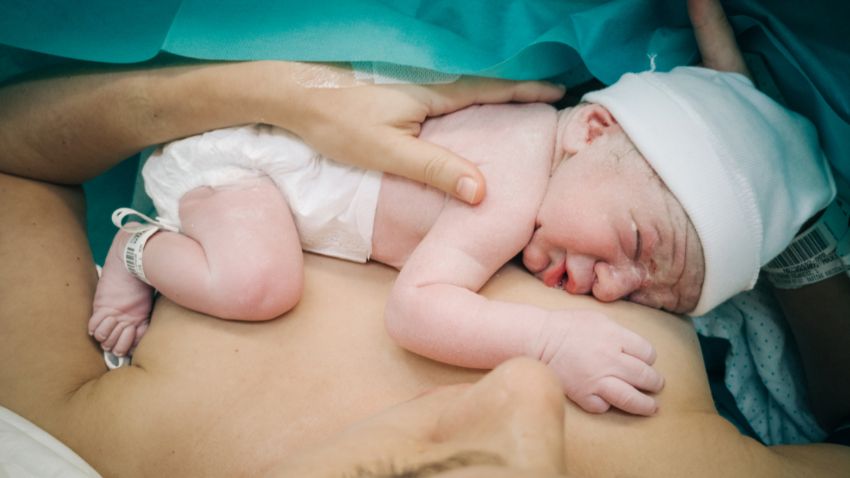
Giving birth in countries like Portugal can provide your child and you with dual citizenship.
Having a second passport increases substantially the opportunities available to anyone. While a child born in Canada may eventually be able to confer permanent residency to their parents through sponsorship, they must be of adult age and have the means to financially support their parents to do so. America, too has a similar process.
While having a child in Canada or the USA may confer citizenship to the child, it does not necessarily mean the parents can stay with them or immediately become citizens as well.
Another reason for birth tourism, aside from birthright citizenship, is affordability. While taking advantage of getting a secondary passport for your child, you can also save money by having your child overseas.
In Brazil, for example, health care is a right even for foreigners, and if you wanted, you could have your child for free in the public system. Or you could opt for the higher-quality private hospitals and still save money vs having your child in the states.
Mexico is another low-cost destination for childbirth, with costs starting as low as $500 USD (although $1500 USD to $2000 USD is probably more typical).
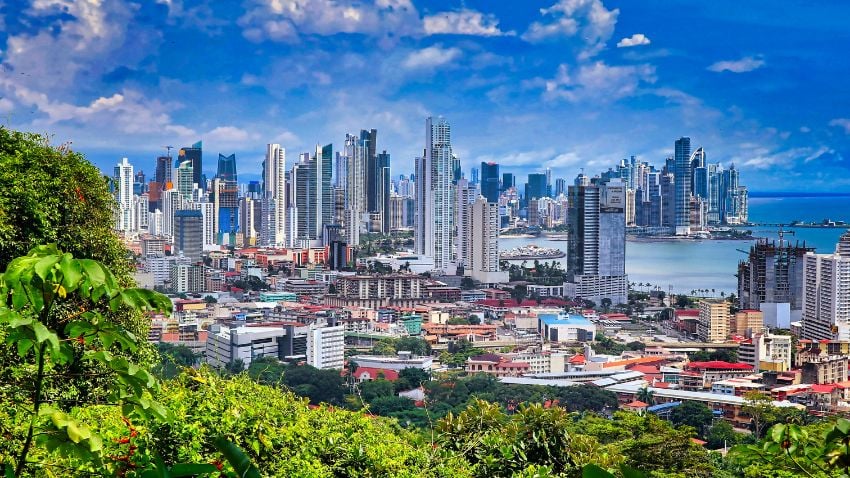
You can apply for Panama Citizenship if you are a parent of a Panamanian citizen
top countries for birth tourism
Most of the countries in the Americas allow for birthright citizenship (Colombia being one notable exception). Canada and the USA are two of the most desirable locations, since being the richest nations they afford their citizens the most economic opportunities.
Mexico and Brazil have their advantages, as they offer parents of so-called “passport babies” a fast track to citizenship, and they are popular expat destinations anyway.
Chile is also a fairly desirable location for birth tourism, as its economy is robust and growing, and its passport is fairly powerful. However, as of 2019, they require at least one parent to be a legal resident.
Panama is another excellent country for birth tourism, as they have high-quality hospitals, and a great economy and they allow parents of Panamanian citizens a fast track to citizenship. They also practice a territorial tax system, so if you become a tax resident there, you do not have to pay any tax on foreign-sourced income.
Here is a list of the best countries in which to give birth:
Before I go into details about engaging in birth tourism, I would like to mention a very desirable passport; however, it is far from easy to acquire. European passports are very sought after mostly because of their high passport strength ranking and visa-free travels to an incredible amount of countries. Only a few European Union countries offer " jus solis ," but all of them have requirements such as having one or both parents being residents or citizens at the time of birth. Portugal is your best choice for European birth tourism since it requires only one of the parents to have been a resident for at least one year.
how to engage in birth tourism
If you are thinking about having your baby in a foreign country in the Americas to take advantage of birthright citizenship, then what is the best way to go about it? First, you must pick the country you want to give birth in. The easiest approach is to go somewhere where you have visa-on-arrival or visa waiver privileges, so you can just go ahead and show up. Alternatively, if you have to apply for a tourist visa to go to that country (we’ll look at Mexico here in our hypothetical, but there are plenty of other options to consider as well), then you must do that planning ahead as it can be time-consuming due to requirements and visa processing time. Alternatively, you could also consider applying for a temporary residency in this country if you have family or business ties there or want to invest in that country .
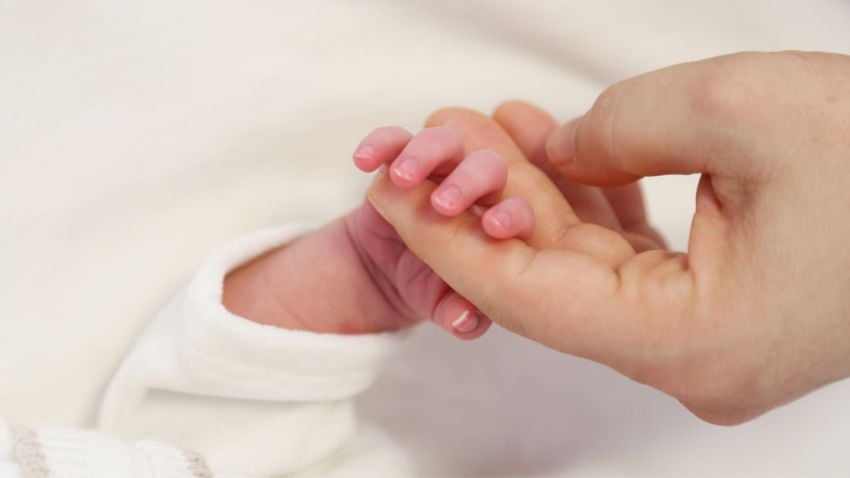
Giving your child dual citizenship due to " jus solis" and " jus sanguinis" is a step towards securing your child's freedom and future.
Once you have figured that out, you want to travel to the country when you are pregnant. You will need to find a good hospital. Make sure you check out the reputation and reviews online and talk to any friends you might have with first-hand knowledge. Of course, you will want to have ample savings to cover both the cost of your hospital stay and your extended stay in Mexico leading up to the birth. You might be pleasantly surprised at some of the differences in medical care and the attention you receive from your physician. Hotels are very affordable in Mexico, so you might opt to stay in a hotel nearby the hospital in the time leading up to your birth to minimize travel time when the big day comes.
After you have your baby, you will need to register them to get a birth certificate, and then once you have that, you can apply for their passport, and you are good to go. If you are interested in Mexican citizenship yourself, then as we mentioned earlier, you can use your child’s status as a Mexican citizen as a means of fast-tracking your own permanent residency and citizenship. And even though your baby is now a Mexican citizen, they will still have the citizenship of their birth parents as well. So if you are a Canadian citizen, then your child will also qualify to be a Canadian citizen; you just have to fill out some paperwork.
Not every government offers this ease for birth tourism. Each government has its set of laws, requirements, and policies, which is why it is important to seek to work with an experienced company. This will save you money, time, and provide reliable and accurate information.
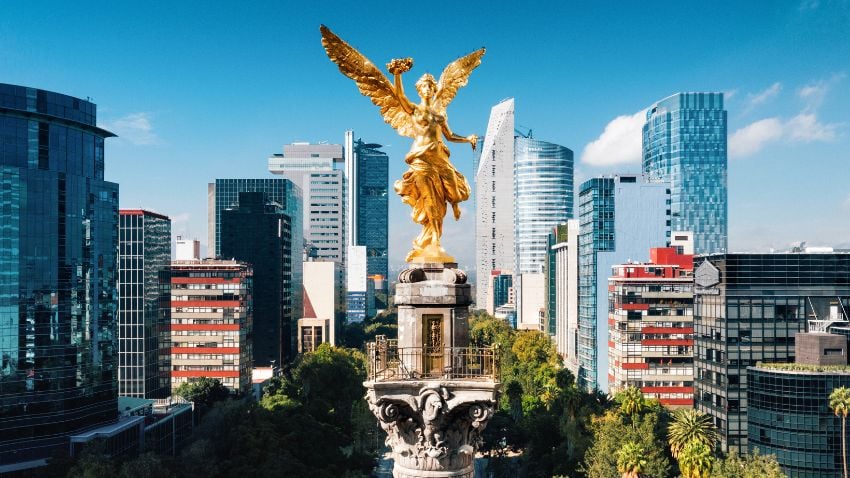
You can get permanent residency in Mexico if you are a parent of a Mexican citizen
OUR PERSONAL STORY
Those of you that have been with me over the past several years know that my wife and I have given birth twice outside our home countries. My daughter was born in the UAE, unfortunately, they do not offer residencies or citizenships through birth; however, our second child was born In Brazil in 2021.
We followed what was set out above. We picked our country of choice, applied for our visas (as a Canadian I did not need a visa, my wife is Chinese, and she did require one, which we were able to apply for and get) and found a company to work with to expedite everything, especially because we don't speak Portuguese.
Before entering Brazil we checked out hospitals and cities to live in, so there were no surprises. When we travelled to Brazil we were 6 months into the pregnancy and worked with a company that helped us with the hospital, paperwork and the many forms required.
In May of 2021, our son was born in a hospital in Florianopolis, Brazil and the staff and facilities were outstanding. The cost was about $2,500 USD, similar to many Latin American countries and we were back in our Airbnb within 3 days.
We stayed in Floripa for 6 months to apply for permanent residency; unfortunately due to Covid, our appointment was set for 6 months in the future. That's another story and another article.
We now have a Brazilian baby! There really is no better way to give your kids this amazing gift that they will have for the rest of their lives. If you have the opportunity, go for it, you will not be disappointed!
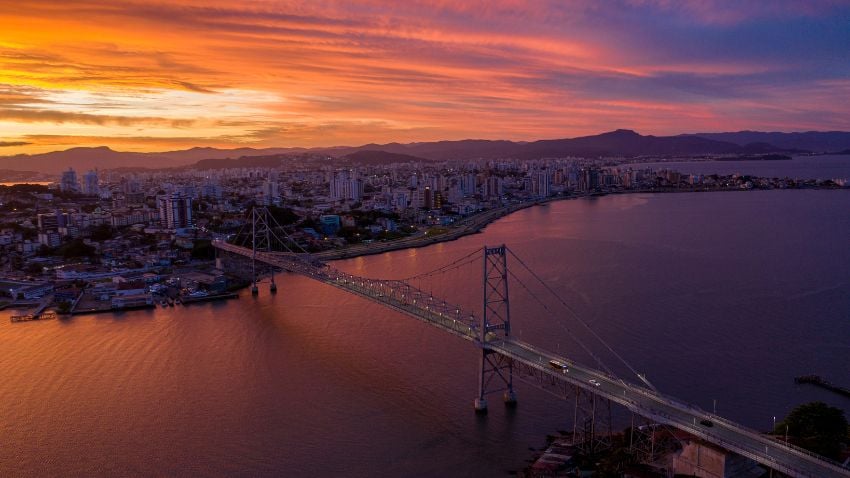
With a Brazilian child it's easy to request for permanent residency in Brazil
As mentioned above, with the travel increase globally, and the increase in remote job opportunities leading more people to a digital nomad lifestyle , we are bound to see an increase in birth tourism. For now, we can see a higher trend for birth tourism in the Americas as most of the countries in the Americas practice " absolute jus solis ." We can only hope others will see benefits in having " absolute jus solis " and will allow for more places like Mexico where it is easy to acquire dual citizenship for your children.

WORK WITH ME
I help my clients to move offshore for freedom, privacy and autonomy by focusing on the immigration, legal, and tax issues that you will face when becoming an expat. If you would like to work one-on-one with me on getting out of your home country (or setting up a Plan-B location), then read this important letter and fill in an application form to become a Private Client . My fees are not cheap; however, I can assure you that when you work with a professional firm like ours, the results will be worth it.
BEST OF THE EXPAT WORLD
If you want the best intel from the expat world, including profitable offshore opportunities, little-known tax-saving strategies, and hard-won insights on immigration, passports, and Plan-B residencies, all delivered to your inbox every single week, then join our daily correspondence, EMS Pulse ™ . Currently enjoyed by over 37,000 expats and expat-hopefuls worldwide. Fill in the form below to join our newsletter free:

Written by Mikkel Thorup
Mikkel Thorup is the world’s most sought-after expat consultant. He focuses on helping high-net-worth private clients to legally mitigate tax liabilities, obtain a second residency and citizenship, and assemble a portfolio of foreign investments including international real estate, timber plantations, agricultural land and other hard-money tangible assets. Mikkel is the Founder and CEO at Expat Money®, a private consulting firm started in 2017. He hosts the popular weekly podcast, the Expat Money Show, and wrote the definitive #1-Best Selling book Expat Secrets - How To Pay Zero Taxes, Live Overseas And Make Giant Piles Of Money, and his second book: Expats Guide On Moving To Mexico.
Posts By Tag
- Expat Destinations (103)
- Permanent Residencies (84)
- Wealth Protection (60)
- Second Passports (58)
- Digital Nomad Visas (56)
- International Real Estate (10)
- Privacy & Secrecy (8)
- Border Restrictions (3)
Recent Posts

Safeguarding Against Inflation: Gold and Silver Strategies
In today's uncertain economic landscape, safeguarding your wealth against inflation is more important than ever. One effective strategy to protect...
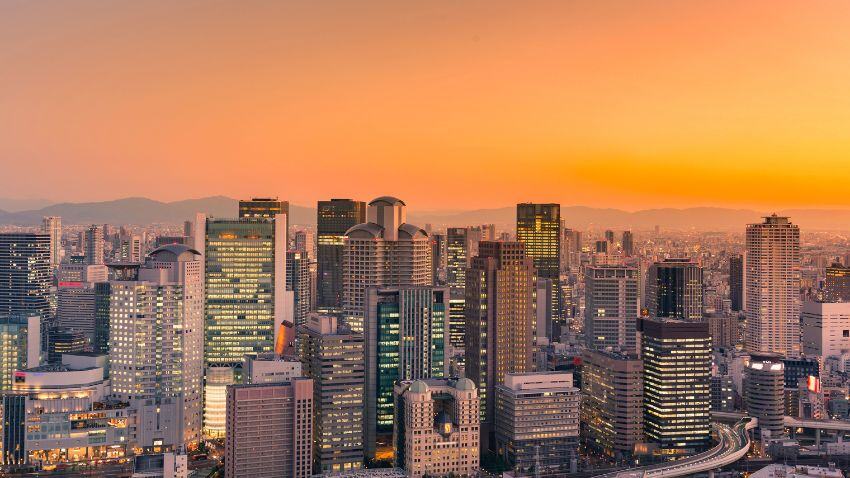
Nominee Services: Enhancing Privacy In Legal Structures For Expats
Many people value privacy for personal reasons, but it’s also one of the key elements to business success. While other factors like tax efficiency,...

In The Long Run, We Are All Dead: A Summary of Biden’s Capital Gains Tax
When the notorious John M. Keynes advocated for excessive government spending to achieve so-called full employment in the economy, free market...

Illegal Border Crossings Today:

Birth Tourism
By Pawel Styrna | March 2020 | Click here for the Full PDF Version
The Issue
Birth tourism is a term which refers to the practice of foreign mothers-to-be traveling to the United States on tourist visas for the specific purpose of giving birth in the U.S. in order to obtain U.S. citizenship for their child. The secondary goal of the mother may be to eventually secure legal permanent resident status, also colloquially known as a “green card.”
It is estimated that 33,000 babies are born to women who arrived on tourist visas every year. While this may not seem like a large number, the abusive practice has been trending upward in recent years. Birth tourism is not explicitly mentioned in the Immigration and Nationality Act, but the State Department recently clarified its policy on visa issuance in light of the risks to national security posed by the practice.
Once U.S. born children turn 21, they can also petition to bring their parents to the country as legal permanent residents. As “immediate relatives,” they do not have to wait in line like other immigrants. For foreign citizens, there are other benefits as well. As one Turkish birth tourist admitted , speaking of her daughter: “I don’t want her to deal with visa issues — American citizenship has so many advantages.” However, it is highly doubtful whether the framers of the U.S. Constitution or the authors of the 14th Amendment would have considered convenient, hassle-free entry for foreign nationals a legitimate purpose of American citizenship.
There are important reasons why birth tourism should concern the average American, particularly with regard to national security and potential wrongdoing by foreign actors. Moreover, as FAIR President Dan Stein points out : “Shady entrepreneurs are profiting handsomely from this practice, American taxpayers are stuck with costs, and the value of U.S. citizenship is further diminished.”
Recent Developments
On January 23, 2020, the U.S. Department of State implemented a rule giving visa officers more discretion to deny a foreign national a B nonimmigrant visa, which is used for business or pleasure, if it is believed the sole purpose of travel is giving birth in the U.S. The Department of State argues that “this rule reflects a better policy, as birth tourism poses risks to national security,” and because “the birth tourism industry is also rife with criminal activity, including international criminal schemes.” The rule also requires visa applicants seeking medical treatment in the U.S. to demonstrate to the satisfaction of a consular officer that they have made arrangements for medical treatment and are able to pay for it. The rule contains several exceptions, such as having a dying relative in the country or a U.S. citizen husband. It does not apply to the 39 countries participating in the Visa Waiver Program.
Why Curbing Birth Tourism Is Necessary
Birth tourism is one of the more brazen abuses of birthright citizenship. The Trump administration has moved to clamp down on this practice because it incentivizes criminal activity and presents a threat to the national security of the United States.
According to the State Department’s new rule, “reporting from U.S. embassies and consulates has documented trends showing an increasing number of B visa applicants whose stated primary purpose of travel is to give birth in the United States.”
The rule also brought attention to “the national security vulnerability that could allow foreign governments or entities to recruit or groom U.S. citizens who were born as a result of birth tourism and raised overseas, without attachment to the United States, in manners that threaten the security of the United States.”
Birth tourism is a criminal business activity that is promoted by many overseas companies – there are approximately 500 in China alone. The birth tourism industry can involve complicated schemes and millions of dollars in criminal proceeds. For example, on January 31, 2019, federal prosecutors announced indictments against 19 people with being involved with the operation of three birth tourism schemes in Southern California. The operators of the “maternity” or “birthing houses” were charging their clients tens of thousands of dollars, and, in one case, “more than $3.4 million in international wire transfers” were received within the span of two years. They also coached their Chinese customers about how to lie to U.S. officials and hide their pregnancies. Furthermore, “the indictments allege that many of the Chinese birth tourism customers failed to pay all of the medical costs associated with their hospital births, and the debts were referred to collection.”
Because the practice is clandestine, there is no definitive breakdown by country of origin . However, according to CIS, there is considerable evidence that many birth tourists come from China, Taiwan, South Korea, Nigeria, Turkey, Russia, Brazil, and even Mexico. Some of these nations – especially Russia and China – have long histories of anti-American espionage activities.
The Solution
The State Department’s new rule cracking down on the abuse of birthright citizenship by birth tourists is a welcome development. However, as in the case of the children of illegal aliens benefiting from automatic U.S. citizenship, it is necessary to reform birthright citizenship. While legislation or an executive action clarifying that automatic birthright citizenship does not apply to individuals born on U.S. soil to illegal aliens and temporarily-present tourists is necessary, it will likely be challenged in court, and, hopefully, appealed. That, in turn, would give the Supreme Court an opportunity to weigh in on an issue on which it has never ruled directly.
For more information, please see FAIR’s issue brief, Birthright Citizenship and Illegal Immigration.
- Mission, Vision, Values
- Career Opportunities
- Meet The Team
- Our Spokespeople
- Meet the President
- Board of Directors
- Immigration Reform Law Institute
- Immigration Issues
- Legal Immigration
- Illegal Immigration
- Border Security
- Sanctuary Policies
- National Security
- Workforce & Economy
- Population & Environment
- Societal Impact
- Popular Topics
- Immigration Infographics
- Illegal Alien Crime
- Companies That Hire H-1B Workers
- History of U.S. Immigration Laws
- Legislative Articles
- Legislation and Policy
- Presidential Administration
- Federal Legislation
- State & Local Policy
- FAIR Take Articles
- Press Releases
- Published Opinion
- Newsletters
- Media Inquiries
- Recent Studies
- Immigration Parole: The Executive Branch’s Shadow Immigration System
- Country Brief: Venezuela
- How Many Illegal Aliens Are in the United States? 2023 Update
- FAIR Cost Study of Illegal Immigration
- The Cost of Mass Immigration on Public Education
- More Publications
- Take Action
- Activist Resources
- How to Report Illegal Aliens
- Join Our Activist Network
- Planned Giving
- Other Ways to Support FAIR

- ES Search for:
Birth Tourism: What Is It And Why Is Argentina One Of Its Destinations?
Birth tourism seems to be the main phenomenon in the increase of russian migration in argentina, what is it about.

Photo: Pexels
LatinAmerican Post | Vanesa López Romero
Escucha este artículo
Your browser does not support the audio tag.
Leer en español: Turismo de parto: ¿qué es y por qué hoy Argentina es uno de sus destinos?
Today Argentina receives hundreds of Russian citizens daily, many of these are couples expecting to give birth and migrating in search of new opportunities away from the war between Russia and Ukraine. This phenomenon, known as birth tourism, is neither new nor does it happen only in Argentina.
What is birth tourism?
Birth tourism consists of traveling to a destination in order to give birth there, this is usually done in order for the baby to receive the citizenship of the place where it was born . Despite the fact that there are other reasons why this type of tourism is practiced, such as couples giving birth in other countries because other destinations may have cheaper or even free health services compared to the country of origin, the search of citizenship is the main one.
This type of citizenship is known as citizenship by birth or "ius soli", which means right to land, and its purpose is not only that the baby can have the political rights of the country of origin, but also that the baby's relatives can more easily access permanent residency and other rights. These babies are known as “anchor babies” or “passport babies”.
The United States, Canada, Hong Kong and Ireland are the places where birth tourism is most practiced. In the case of the United States, it must be taken into account that the migratory crises have put this practice under some control: during the Trump administration there were attempts to apply visa rules on pregnant women in order to lower the rate of immigrants into the country. However, giving birth in the United States is not a crime and the regulations around this phenomenon depend on the visa.
The increase in this phenomenon around the world has led countries such as Australia, France, Germany, among others, to decide to regulate their policies regarding childbirth tourism , which internationally is not seen as an illegal practice. Thus, now these countries require that at least one of the parents of the baby must be a citizen or legal permanent resident.
Also read: Whose Children? The Problem Of Surrogate Wombs In Ukraine
Why is argentina a birth tourism destination for russians.
Argentina is the country with the most immigrants in Latin America. According to UN data, by 2022 the country had 2.28 million immigrants, that is, 5% of the total population. The most important migrations that Argentina has received are from Italians, Spanish, French and Russians. Regarding the latter, it must be taken into account that the Russian population in Argentina has been forming since the end of the 19th century and its fifth wave occurred in 1985, which coincided with the perestroika reform of the Soviet Union.
However, with the outbreak of the war between Ukraine and Russia, it seems that we are facing a sixth wave of Russian migration to Argentina that is accompanied by the phenomenon of birth tourism. Georgy Polin, head of the consular department of the Russian Embassy in Argentina, estimated that for this year the number of Russian people traveling to Argentina for these purposes could reach 10,000. This is largely due to the fact that Russian citizens do not require a visa to travel to the Latin American country, but also to the ease of carrying out procedures such as extending the limit of stay and applying for a residence permit. This makes sense if we take into account that the country has prepared itself in terms of migration over the years and its system is much more efficient than in other countries in the region.
Although there are several Russians who practice childbirth tourism in order to return to their country of origin, they are the majority who seek to stay in the country to which they travel. Argentina is not the only destination, but it is one of the favorites for Russians seeking to flee the war that their government has started with Ukraine, a war with which many of them disagree. In Argentina they have found not only an escape, but also the possibility of a future.
Jacinda Ardern Leaves a Distinct Legacy of Governing
Car free day: is the bicycle really a mobility option in bogota, related articles.

Argentina Seeks Arrest of Iranian Minister for 1994 AMIA Bombing
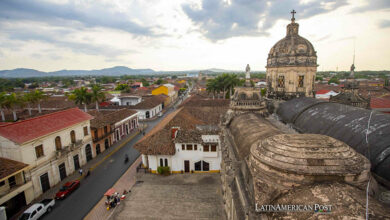
Granada, Nicaragua’s Colonial and Tourist Jewel, Celebrates 500 Years
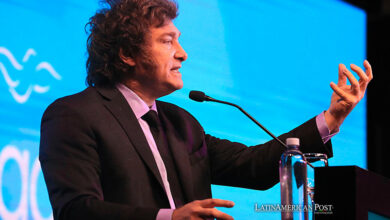
Argentina’s Milei Again Seeks Radical Economic Overhaul with New Bills

Argentina’s Pope Francis to Address AI Ethics at G7 Summit in Italy
Leave a reply cancel reply.
Your email address will not be published. Required fields are marked *
Save my name, email, and website in this browser for the next time I comment.
Current ye@r *
Leave this field empty


All About Having a Baby in Mexico (Birth Tourism)
August 20, 2023 darcy comments 1 comment.
When I was growing up, people born outside the US to American parents were almost always in the military, stationed overseas. These days, it’s becoming more popular to have a baby in Mexico as a means of giving your child dual citizenship and more opportunities.
Having been there, done that, and gotten the maternity t-shirt, I figured that maybe my experience can help someone choose to do – or avoid! – the same.
I’ll be honest, it felt like most US citizens that give birth in Mexico speak Spanish better that us, or have a spouse who is from Mexico. I did kind of wonder if we were crazy, making a short term move to Mexico to have a baby.
Keep reading to get an overview of our experience, or click below to the detailed posts: Our Experience with Birth in Mexico The Acta de Nacimiento (Mexican birth certificate) The CRBA and US Passport The Mexican Passport Mexican Residency – we are entitled to Mexican residency, but have not yet applied
The idea to give birth in Mexico, or birth tourism, has become more popular. There are now many agencies that facilitate every step of the process for you – if you pay them a handsome fee. That’s not our style, and it’s certainly not necessary. However, if money isn’t a factor in your choice, hiring a birth agency may be a great option.
Why We Decided to Have a Baby in Mexico
The main reason to give birth in Mexico is financial. I gave birth to our first child in the USA, and even with insurance the cost was about $12,000. That’s the price we pay for being contract employees (aka self-employed) whose only insurance option is healthcare marketplace. My understanding is that a subsequent administration gutted the “affordable” out of the Affordable Care Act. These days, it’s poor coverage and high prices.
The cost of having a baby in Mexico was just under $5000, in a private hospital with no insurance. If you include the rent that we paid for the four months we were there, the total cost is still cheaper than our US experience at $10,500. And obviously our rent was not cheap.
In addition to the immediate financial benefits, the nice thing about a Mexican passport is travel visa-free to many countries. He can visit places like South America without paying “reciprocal fees.” Essentially, the US made it so expensive for some travelers to visit, that those countries started making US tourist visas equally expensive. Traveling in on a Mexican passport would be significant cheaper.
With a Mexican “anchor baby,” the parents and siblings can apply for permanent residency, aka a green card.
And finally, who wouldn’t want to spend the final months of pregnancy basking in the sun on a Mexican beach?
How We Got Started
We’d read about a couple other travelers who had a baby in Mexico and that’s what sparked the idea. When we decided to actually commit to planning, our priority was finding a good doctor. There’s a lot of myths about Mexico that may scare people off, but there is one very real concern: unnecessary c-sections. Worldwide, the c-section rate is about 20%. In the USA it’s around 30%. Mexico clocks in at a whopping 45%. A c-section is a wonderful option when it is medically necessary, but I absolutely cannot imagine recovering from surgery with a toddler and a newborn – especially if it’s avoidable.
We found a doctor who only performs c-sections when needed, and she speaks good English. So that gave us a location to target. Then we found an airbnb in Puerto Vallarta, got in contact with the owners. We asked if they’d offer us a cheaper rate for our longer term stay. They offered us a lease so we could avoid the astronomical airbnb fees and taxes. It was still 50% higher than any rent we’ve ever paid, but it was short notice and a great location. It even had a pool!
We booked flights. Dream became reality.
Prenatal Care in Mexico
We arrived in Mexico right around the start of my third trimester. Appointment scheduling was almost exactly the same as the US. Monthly appointments for most of the pregnancy, then towards the end every 2 weeks, and then weekly until birth. I had no local health insurance, I paid 900 pesos per visit ($50). Each visit included an ultrasound, and towards the end they also did a non-stress test.
We decided on an elective induction so that we could ensure childcare for our toddler, one of the few downsides to giving birth so far from home. It was an extremely gentle induction, so gentle that it felt more like waiting for natural labor. As things ramped up, my doctora even came to our apartment to check how I was progressing (she made sure we knew that house calls were not standard, but she lived just a few blocks from us).
When she gave the word, we all headed to the hospital. It was also right in our neighborhood, only 1km away.
Total cost of 6 OB appointments, labwork, a special ultrasound, and prescriptions: $555.82
Birth in a Private Hospital in Puerto Vallarta
I won’t get too graphic here, but the birth happened quickly. Both the doctora and the hospital said they’d never had anything like that happen before. So, while I was very excited to get an epidural, I had the baby before the anesthesiologist even arrived at the hospital. My experience with the hospital was absolutely on par with the US. One difference is that the nurses didn’t really interact much, leaving that to the doctors. However, that could have been because of the language barrier. At the hospital, most of the doctors spoke good English and most of the nurses did not. Puerto Vallarta is a big tourist town, including medical tourism, and many locals speak good English.
After the initial pediatrician check, baby Arrow never left my side. As is common in Mexico for a birth with no complications, we left the hospital in less than 24 hours after giving birth.
Cost of OB delivery: $2490.74 Cost of private hospital: $1501.88

Differences in Newborn Care in Mexico
Here is where my healthcare experience in the US really diverged from my experience in Mexico. In the US, the metabolic test and hearing test were done right at the hospital when I gave birth. They also took care of getting the birth certificate and the social security number. They also performed the first vaccine right there at birth. Then we had to schedule the first pediatrician appointment for 3 days after birth.
In Mexico, these were all separate appointments and errands that we had to run. We needed to get the vaccine at Centro de Salud within the first 7 days of life, and the metabolic test at a lab within the first two months, and the hearing test at a clinic within the first 3 months. The hospital gave us a hospital birth form, and we needed to take that and other documentation to the Registro Civil (civil registry) to get the Acta de Nacimiento (birth certificate) and CURP (Mexican version of a social security number). The first pediatrician appointment was 10 days after birth, as was my postpartum OB visit.
For parents with a toddler and a newborn, it was A LOT. Mexicans observe “cuarentena,” where a mother stays home to recover and bond with her newborn for the first 40 days. I don’t understand how I was supposed to get half a dozen postpartum appointments accomplished without leaving the house. Every day we were trying to get something else done. It took us three trips to Registro Civil to get the Acta, and two trips to the blood lab to get the metabolic test. It was exhausting.
Vaccinations
In Mexico, vaccinations are a child’s right. We had our first experience with Centro de Salud when our toddler needed his next round of vaccinations. I walked in with the kid, he got his shots, and we walked right back out. Not only did they not ask for money, they hardly even asked for proof of his age or what shots were necessary (hopefully this is related to me being a foreigner and also the language barrier, and not their standard).
With the newborn, it was the same thing. I walked in, he got his shots, we walked out. It was so great that I specifically planned our departure from Mexico around the 2-month vaccines. I wasn’t leaving without them! We were flying into a US state where we didn’t have health insurance, making easy, free vaccines in Mexico superior to figuring out where to get them done in the USA.
Documenting Our New Baby
So, as I just said, it took us three trips to Registro Civil to get our Acta de Nacimiento . The Acta is critically important because it is the piece of paperwork we needed before we could start the process of documenting our child as a US citizen, which had to be done before we could go back to the States.
Once we had the Acta, we submitted the application for a Consular Report of Birth Abroad. The CRBA functions as a US birth certificate for citizens born abroad. It was our understanding that we could go to the consular office in Puerto Vallarta for our CRBA. It seems that Covid changed that process. Instead, our family of four had to fly to Guadalajara to the consulate. But first we had to secure an appointment!
The consulate told us it could take up to four months to hear back about scheduling an appointment. Another person who’d recently been through this said that it took four months to get their appointment at the consulate, but then the consulate gave them 5 days notice for their appointment. If they were not able to make it to their appointment, the process would have started all over again. We only had our apartment leased for two more months, so between this and the news that we had to fly with our newborn and toddler, we were thoroughly stressed out.
Instead, we specified that we had extenuating circumstances and needed an emergency appointment. We had upcoming travel plans, and had no lodging past that date. Within 5 days of submitting our application, we had an appointment scheduled for 3 weeks later. We had to fly to the consulate with extensive documentation for both us and the baby, but at our appointment we were approved for the CRBA, and we were able to get an emergency passport printed within an hour of being granted citizenship.
As soon as we had the Acta, we also scheduled an appointment for a Mexican passport. We did not need this in order to return to the USA, but it was my understanding that it was a quick and easy thing to acquire. That was a big fat lie. It took 6 trips to the SRE, every time they told us “Oh, we just need one change to the paperwork, and then you’re all set!” And every time, they would find something else that was wrong. We finally received the Mexican passport 4 days before we flew back to the USA.
Lastly, once we were back in the US, we had to visit a Social Security Administration office to complete our application for a social security number. It took a single visit and was no trouble at all.

Other Resources for Having a Baby in Mexico
Rebel Heart – A couple that, like us, had a baby in the USA then later had a baby in Puerto Vallarta, Mexico. They had to nuke their blog after internet trolls targeted them, but their helpful pages about birth in Mexico have been preserved by archive.org. Charlotte documented her experience pretty extensively, she shares some great tips for having a baby in Mexico. Some of the information is outdated, Registro Civil is in a different building, and the consular office is no longer processing CRBAs.
Anna Everywhere – Another woman who extensively wrote about her experience giving birth in Cancun. She is the only one I’ve seen write about the process for getting permanent residency in Mexico after having a baby there.
Foxflat – A woman who blogged about having a baby in Mexico City. Katie mainly talks about the medical side of the experience, but doesn’t talk about the bureaucracy too much. She hired a lawyer to get the Mexican birth certificate for them, and I’m very jealous that she had that option.
LuxPats – A couple who intended to blog about the whole paperwork process for documenting their anchor baby in Mexico, but only made it as far as the Acta de Nacimiento (I suspect they, like us, have some PTSD about the experience – paperwork trauma). It took them 9 weeks to get the baby’s Mexican birth certificate!
Facebook – For better or for worse, no one really blogs anymore. Instead, the information is shared via Facebook, which means it’s not readily available via internet search. I joined the Puerto Vallarta Facebook group and gleaned some information there, and I also made a couple contacts that answered a lot of my questions. Many thanks to the kind strangers who wrote paragraphs and paragraphs of information to help ease our stress levels.
One thought on “ All About Having a Baby in Mexico (Birth Tourism) ”
Wow! Great write up! You had me on edge of my seat! Beautiful pictures!
Tell us what you think! Cancel reply
Birth tourism brings Russian baby boom to Miami
MIAMI — Lured by the charm of little Havana or the glamour of South Beach, some 15 million tourists visit Miami every year.
But for a growing number of Russian women, the draw isn't sunny beaches or pulsing nightclubs. It's U.S. citizenship for their newborn children.
In Moscow, it's a status symbol to have a Miami-born baby, and social media is full of Russian women boasting of their little americantsy .
"It's really common," said Ekaterina Kuznetsova, 29. "When I was taking the plane to come here, it was not only me. It was four or five women flying here."
Ekaterina was one of dozens of Russian birth tourists NBC News spoke to over the past four months about a round-trip journey that costs tens of thousands of dollars and takes them away from home for weeks or months.
Why do they come?
"American passport is a big plus for the baby. Why not?" Olesia Reshetova, 31, told NBC News.
"And the doctors, the level of education," Kuznetsova added.
The weather doesn't hurt, either.
"It's a very comfortable place for staying in wintertime," Oleysa Suhareva said.
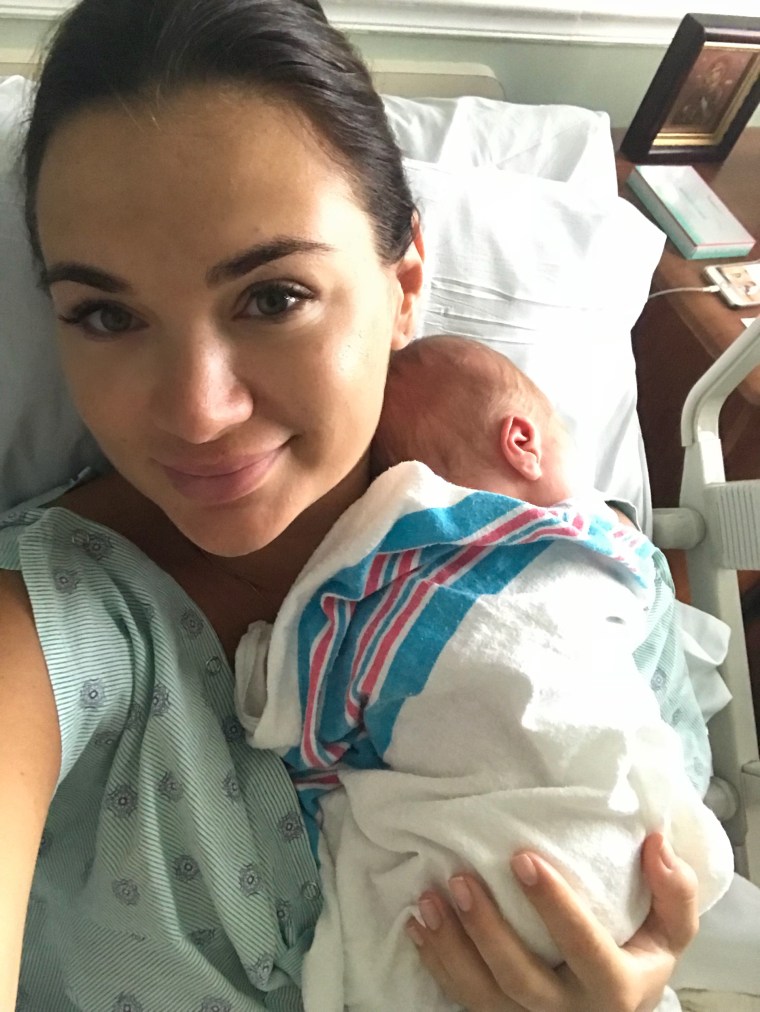
It's not just the Russians who are coming. Chinese moms-to-be have been flocking to Southern California to give birth for years.
What they are doing is completely legal, as long as they don't lie on any immigration or insurance paperwork. In fact, it's protected by the 14th amendment to the U.S. Constitution, which says anyone born on American soil is automatically a citizen.
The child gets a lifelong right to live and work and collect benefits in the U.S. And when they turn 21 they can sponsor their parents' application for an American green card.
As president, Donald Trump has indicated he is opposed to so-called chain migration, which gives U.S. citizens the right to sponsor relatives, because of recent terror attacks. And as a candidate, he called for an end to birthright citizenship, declaring it in one of his first policy papers the "biggest magnet for illegal immigration."
"You have to get rid of it," he said on "Meet the Press" on NBC. "They're having a baby and all of a sudden — nobody knows — the baby is here. You have no choice."
In a twist, as the Daily Beast first reported , condo buildings that bear the Trump name are the most popular for the out-of-town obstetric patients, although the units are subleased from the individual owners and it's not clear if building management is aware.
There is no indication that Trump or the Trump Organization is profiting directly from birth tourism; the company and the White House did not respond to requests for comment.
Roman Bokeria, the state director of the Florida Association of Realtors told NBC News that Trump- branded buildings in the Sunny Isles Beach area north of Miami are particularly popular with the Russian birth tourists and Russian immigrants.
"Sunny Isles beach has a nickname — Little Russia — because people who are moving from Russian-speaking countries to America, they want … a familiar environment."
"They go across the street, they have Russian market, Russian doctor, Russian lawyer," he added. "It's very comfortable for them."
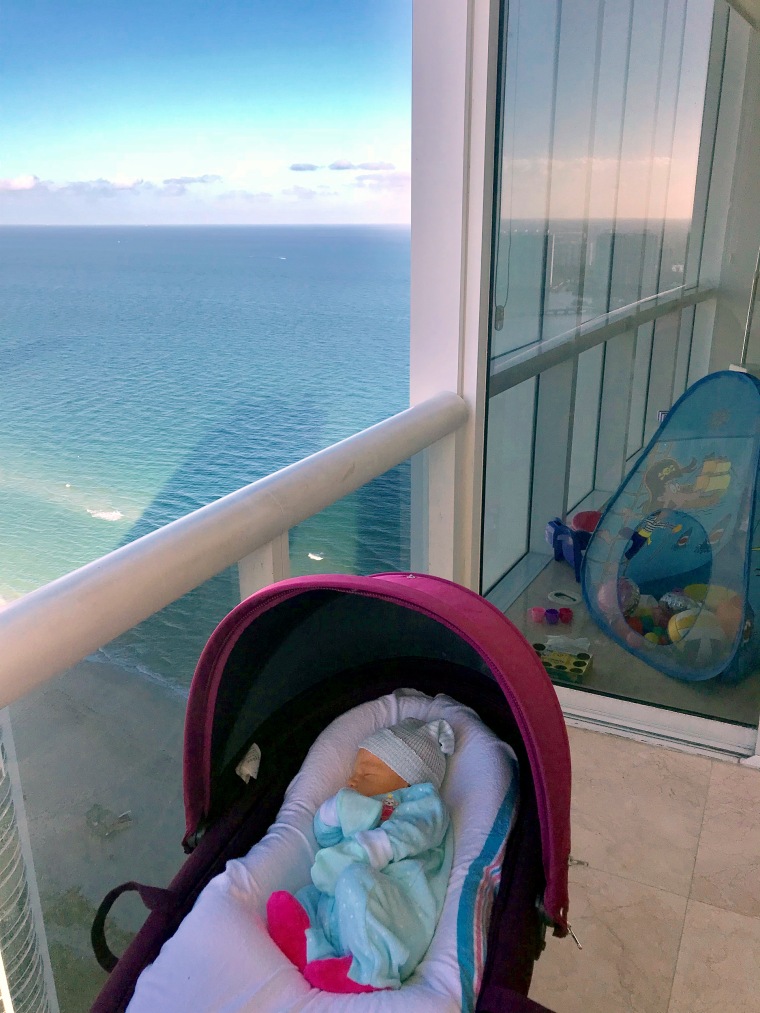
Reshetova came to Miami to have her first child, hiring an agency to help arrange her trip. The services — which can include finding apartments and doctors and obtaining visas — don't come cheap. She expects to pay close to $50,000, and some packages run as high as $100,000. Bokeria says some landlords ask for six months rent up front.
One firm, Miami Mama, says it brings about 100 Russian and Russian-speaking clients to the U.S. per year, 30 percent of them repeat clients. The owners are Irina and Konstantin Lubnevskiy, who bought Miami Mama after using the firm to have two American children themselves.
The couple says they counsel clients to be completely transparent with U.S. immigration officials that they're expecting.
"We tell every client, 'You have the documents, you have to tell the truth. This is America. They like the truth here,'" Konstantin said.
"I would like the American people to understand they don't have to worry," he added. "Those who come here want to become part of the American people."
But Miami Mami has drawn scrutiny from law enforcement. In June, it was raided by the FBI, and an employee was convicted of making false statements on passport applications. The owners say they knew nothing about it, fired the worker and their business license was renewed.
Federal prosecutors declined to comment on the case, and the FBI said it could not discuss "an active investigation."
There is no official data on birth tourism in the United States. The Center for Immigration Studies, which wants stricter limits on immigration, estimates there are 36,000 babies born in the U.S. to foreign nationals a year, though the numbers could be substantially lower. Florida says births in the state by all foreign nationals who live outside the United States have jumped 200 percent since 2000.
Customs and Border Protection says there are no laws governing whether pregnant foreign nationals can enter the country or give birth here.
"However, if a pregnant woman or anyone else uses fraud or deception to obtain a visa or gain admission to the United States, that would constitute a criminal act," the agency said.
When federal agents raided California "maternity hotels" catering to Chinese clients in 2015, authorities said in court papers that some of the families falsely claimed they were indigent and got reduced hospital rates.
In Miami, the Jackson Health System said 72 percent of international maternity patients — who represented 8 percent of all patients giving birth last year — pay with insurance or through a pre-arranged package.
Reshetova said she understands the concerns some have about birth tourism, because it's also an issue in Russia.
"But I pay by myself," she said. "I pay with my money, bring it here to America. I'm not going to take something to America.
"I don't know what my daughter will choose in future. But if I can spend money — my money — for her choice, why not?"
Cynthia McFadden and Sarah Fitzpatrick reported from Miami, and Tracy Connor from New York. Anna Schecter contributed reporting from New York, and Natasha Lebedeva from Washington.
Cynthia McFadden is the senior legal and investigative correspondent for NBC News.
Sarah Fitzpatrick is a senior investigative producer and story editor for NBC News. She previously worked for CBS News and "60 Minutes."
Tracy Connor is a senior writer for NBC News. She started this role in December, 2012. Connor is responsible for reporting and writing breaking news, features and enterprise stories for NBCNews.com. Connor joined NBC News from the New York Daily News, where she was a senior writer covering a broad range of news and supervising the health and immigration beats. Prior to that she was an assistant city editor who oversaw breaking news and the courts and entertainment beats.
Earlier, Connor was a staff writer at the New York Post, United Press International and Brooklyn Paper Publications.
Connor has won numerous awards from journalism organizations including the Deadline Club and the New York Press Club.
She lives in Brooklyn, N.Y.
Anna Schecter is a senior producer in the NBC News Investigations Unit.
- Share full article
Advertisement
Supported by
3 Arrested in Crackdown on Multimillion-Dollar ‘Birth Tourism’ Businesses

By Miriam Jordan
- Jan. 31, 2019
Three people who operated multimillion-dollar birth-tourism businesses in Southern California were arrested Thursday in the biggest federal criminal probe ever to target the thriving industry, in which pregnant women come to the United States to give birth so their children will become American citizens.
The businesses coached their clients to deceive United States immigration officials and pay indigent rates at hospitals to deliver their babies, even though many of the clients were wealthy, investigators said. Some Chinese couples were charged as much as $100,000 for a birth-tourism package that included housing, nannies and shopping excursions to Gucci.
A tip sheet for customers, entitled “Strategies to Maximize the Chance of Entry,” recommended stating on a visa application that pregnant mothers intended to stay at the “5-star” hotel, “Trump International Waikiki Beach,” to convince immigration officials that they were well-to-do vacationers, not mothers traveling with the intention of giving birth on American soil, investigators said.
Grand jury indictments unsealed Thursday in Federal District Court in Los Angeles brought the total number of people charged in the schemes to 19, including both business operators and clients. But some of those targeted in the indictments were not presently in the United States, investigators said.
The appeal of bearing an American child, long associated with immigrants who enter the country illegally, has spurred a birth-tourism industry that now caters to people from all over the world.
[ Birth tourism is legal in Canada . A lawmaker calls it unscrupulous.]
The industry is growing at a galloping pace, especially among Chinese nationals experiencing uncertainty over their country’s long-term economic prospects, investigators said. The number of businesses in operation is undoubtedly much larger than the three agencies targeted in the latest indictments in the Los Angeles area, said Mark Zito, assistant special agent in charge of Immigration and Customs Enforcement’s Homeland Security Investigations in Los Angeles.
“We are talking about three takedowns in L.A., when there are probably 300,” Mr. Zito said. “We have seen more businesses pop up. It is probably going stronger now than it was in 2015.”
While the agencies charged in the current investigation cater mainly to Chinese parents, Mr. Zito said investigators have also found evidence of Russians heading to the Northeast and Nigerians traveling to Texas for the sole purpose of having American children. The Middle East is also a growing generator of birth tourism, investigators said.
“We are trying to quell this, but it is increasing. Other nations will start taking advantage of this,” Mr. Zito said.
The phenomenon of so-called anchor babies has fueled criticism from advocates of tougher immigration laws who are concerned that foreign adults are using their children to secure permanent residency in the United States and from there, access to public benefits.
The indictments include an array of charges, including visa fraud, wire fraud and identity theft, against owners of the birth-tourism agencies that are accused of enabling thousands of Chinese women to come explicitly to give birth to American children.
“Statements by the operators of these birthing houses show contempt for the United States, while they were luring clients with the power and prestige of U.S. citizenship for their children,” Nick Hanna, United States attorney in Los Angeles, said in a statement. “Some of the wealthy clients of these businesses also showed blatant contempt for the U.S. by ignoring court orders directing them to stay in the country to assist with the investigation, and by skipping out on their unpaid hospital bills.”
There are no official figures for how many babies are delivered to tourists on American soil. The Center for Immigration Studies, a group that supports restricting immigration, puts the number at about 36,000 annually in a 2015 report.
“The fact that we have no idea of the scale of birth tourism is a problem in and of itself,” said Jessica Vaughan, director of policy studies at the center in Washington. “We should not tolerate an entire industry that encourages people to come here for the sole purpose of having a child who leaves with a U.S. passport.”
In recent years, the practice has prompted some lawmakers, who have opposed children of undocumented immigrants automatically becoming citizens, to propose repealing birthright citizenship , which is enshrined in the 14th Amendment of the Constitution.
President Trump last year claimed erroneously that the United States is the “only country in the world” that automatically confers citizenship to anyone born in the country. In fact, it is one of at least 30 countries that do so.
Still, the United States has struggled to rein in birth tourism because it is not unlawful for foreigners who are pregnant to travel to the United States or to have babies in the country.
“Birth tourism is a gray area of the law,” said Ms. Vaughan, who called “at the very least” for a revision of citizenship rights to prevent those who are in the country for only the first few weeks of their lives from retaining citizenship for life.
China, home to a burgeoning moneyed class that includes many who are eager for a foothold in the United States, is the biggest market for the birth-tourism industry. The United States offers educational opportunities for their children and a safe haven down the road in the event of political and economic instability in their home country.
The indictments allege that government officials, doctors and lawyers are among those traveling from China to the United States to have children.
The businesses were dismantled following raids in 2015 by the special agents on several sites where the businesses housed pregnant women, in Los Angeles, San Bernardino and Orange Counties. But it is not clear how long the three birth-tourism agencies had been operating.
Dongyuan Li, a resident of Irvine, Calif., who ran a business called “You Win USA,” is accused in the indictment of renting about 20 units in a luxury apartment complex in Irvine under the names of people who did not occupy them as part of an “illegal international birth tourism scheme.” Clients spent a couple of months there before giving birth and were then replaced with newly arrived pregnant women, the charging document said.
On its website, Ms. Li’s company touted the benefits of having an American child, including a “most attractive nationality;” “priority for jobs in U.S. government, public companies and large corporations;” and the opportunity to immigrate to the United States once that child became an adult and could sponsor a parent for a green card.
The business, which advertised on its website that it had handled 500 births, charged each client $40,000 to $80,000 for a range of services that included coaching on how to respond to questions at a visa interview, fill out forms and disguise the true motive for travel from Customs officers at the airport on arrival, according to the indictment.
One customer is alleged to have falsely stated on a visa application that she would be spending 12 days at the “Trump International Hotel” in Hawaii.
You Win USA recommended that clients flew from China to Hawaii and then connected on a domestic flight to Los Angeles, their final destination, to clear passport control in Honolulu and avoid tougher scrutiny expected from officers in California.
It promised a refund to any customer who was not admitted into the country on arrival, according to the indictment.
The business arranged accommodation, prenatal care and shopping trips for the women. In some cases, the indictment said, it instructed clients to fabricate financial documents to enable them to obtain visa extensions, and it deposited money temporarily in their bank accounts.
Mr. Zito, the special agent, said clients were advised to claim they lacked insurance, which entitled them to pay the indigent rate at whichever hospital they used to deliver their babies.
In some cases, he said, the women returned to China and canceled their credit card to avoid paying even that rate, about $4,000, which is a fraction of what it costs most women in the United States to deliver a baby.
At the same time, he noted, “they would have nannies and buy things at Gucci and Hermes at South Coast Plaza,” a high-end mall in Costa Mesa, Calif., where many shops have Mandarin-speaking attendants to help the numerous Chinese customers.
Ms. Li was arrested on Thursday, along with the operators of USA Happy Baby, another agency associated with birth tourism, according to the indictment: Michael Wei Yueh Liu, of Rancho Cucamonga, Calif., and Jing Dong, of Fontana, Calif.
Another indictment charges Wen Rui Deng, operator of a business based in Los Angeles called Star Baby Care, believed to be the largest birth-tourism operation in the country. There was no arrest in that case because Ms. Deng is believed to be in China, investigators said.
- Skip to main content
- Keyboard shortcuts for audio player
Florida's 6-week abortion ban is now in effect, curbing access across the South

Stephanie Colombini

Thousands of abortion rights protesters rallied in Tampa on Oct. 2, 2021. Stephanie Colombini/WUSF hide caption
Thousands of abortion rights protesters rallied in Tampa on Oct. 2, 2021.
TAMPA, Fla. — Starting today, people can no longer access legal abortions in Florida beyond six weeks of pregnancy, except in rare circumstances.
The restriction replaces a 15-week ban that's been in effect since July 2022, shortly after the U.S. Supreme Court overturned Roe v. Wade .
Abortion rights supporters say it will dramatically curb access to the procedure for thousands of residents in Florida and around the South. Proponents of the ban say it "protects life."

Abortion rights on the ballot may not be bad news for Republicans everywhere
Voters will have a say on the matter in November when a proposal to enshrine abortion rights into the state constitution will appear on the election ballot. Regardless of what happens this fall, the ban could have far-reaching effects.
Opponents of the ban stress that many people don't realize they are pregnant at six weeks. But for those that do, abortion services remain available in the state until that time frame.
Abortion care providers in the state like Planned Parenthood are doing ultrasounds earlier and have extended their hours to accommodate as many patients as they can.
"We want to be able to help everyone with information in order to access care as quickly as possible," says Barbara Zdravecky, interim CEO of Planned Parenthood of Southwest and Central Florida.
Still, she expects many patients will be too far along when they reach out for help.
"The emotional turmoil that's going to happen, the anger, the fear, the anxiety is going to be great," says Zdravecky, who adds centers are ramping up support staff to respond to patients' concerns and help them navigate their options.
Adding to scheduling challenges are Florida's 24-hour mandatory waiting period and a ban on using telemedicine for abortions. Patients have to attend two in-person appointments, one for a consultation and another for the procedure at least one day later.
The South loses a major abortion access point

An examination room in a clinic that provides abortion care on April 30, 2024, in Jacksonville, Fla. Joe Raedle/Getty Images hide caption
An examination room in a clinic that provides abortion care on April 30, 2024, in Jacksonville, Fla.
Florida joins eleven other states in the South that have already severely restricted abortion in recent years, either with six-week bans or total bans. Residents in those places have relied on Florida to access the procedure.
Out-of-state residents fueled a steady increase in abortions in Florida despite the 15-week ban. Nearly 8,000 people traveled to the state last year for abortions, according to data from the state Agency for Health Care Administration. That's nearly 10% of all patients.
"We don't want to be an abortion tourism destination," Gov. Ron DeSantis said last fall .
Florida is no longer an option for the rest of the region. North Carolina allows abortions until 12 weeks of pregnancy, but has a 72-hour mandatory waiting period with in-person requirements, so it isn't always a viable alternative.
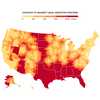
Shots - Health News
How florida and arizona supreme court rulings change the abortion access map.
Instead, advocates that help people access abortions are advising them to travel further to places like Virginia, Illinois or Washington, D.C. That will become increasingly difficult if clinics in states with expanded abortion access struggle to accommodate the influx of patients.
"We're estimating about 90% of our callers are going to need to go out-of-state and that we'll have a large increase in callers because this is going to be a whole new cost for people seeking abortions," says McKenna Kelley, a volunteer board member with the Tampa Bay Abortion Fund.
Abortion funds can help pregnant people cover the cost of abortion procedures and relieve some of the logistical challenges associated with seeking care. But paying for flights, hotel stays and other expenses associated with long-distance travel is much more challenging than giving someone a ride to a nearby clinic.
While what Kelley calls "rage donations" poured in from supporters angry about the Dobbs v. Jackson Women's Health Organization decision in 2022, abortion funds say Florida's recent ban hasn't been met with the same response. Organizers fear they won't be able to help everyone in need, but say funds are working together to form a stronger support network around the country.
Even with assistance, travel may not be an option for some people, which means they may choose to self-manage their abortions or carry unwanted pregnancies to term.
"This truly is an American health care crisis," says Zdravecky with Planned Parenthood.
Supporters of the ban suggest pregnancy centers that oppose abortion as alternatives

Orlando Police officers move back anti-abortion rights protesters near the "Rally to Stop the Six-Week Abortion Ban" in Orlando, Fla., on April 13, 2024. Joe Raedle/Getty Images hide caption
Orlando Police officers move back anti-abortion rights protesters near the "Rally to Stop the Six-Week Abortion Ban" in Orlando, Fla., on April 13, 2024.
Opponents of abortion rights in Florida advocated for the state's six-week ban and have also been busy gearing up for its implementation.
"Our position is we need to protect unborn children, we need to celebrate life, protect life, that's the chief role of government," says John Stemberger, president of Liberty Counsel Action, a religious liberty organization that supports abortion bans.
The group has been briefing the nearly 200 crisis pregnancy centers in Florida about the law and how to prepare for a potential increase in demand for services, he says.
These centers are usually run by faith-based organizations. They encourage pregnant women not to get abortions and to consider parenting or adoption instead. They sometimes offer free ultrasounds or baby supplies.
"We really want to appeal to young mothers or even older mothers who are in what we'd consider a crisis pregnancy to basically think differently about the issue," says Stemberger.
The law that imposes the six-week abortion ban also increased funding for pregnancy centers to $25 million, up from roughly $4 million in 2022.
Some crisis pregnancy centers have been known to provide people with misleading or inaccurate medical information. There have also been calls for more oversight.
Adoption services in the state are also preparing to support more birth mothers who may choose that option.
Florida's six-week ban includes exceptions for some vulnerable communities and when a mother or fetus' life is in danger.
Survivors of rape, incest or human trafficking can access abortions until 15 weeks of pregnancy under the new law, but it mandates they provide documentation, such as a police report or medical record, and providers may be obligated to report the crime in some cases.
Many survivors don't feel safe or comfortable reporting assaults, says Stephanie Loraine Piñeiro, executive director of the abortion fund Florida Access Network. She calls the requirements "unrealistic" and "incredibly cruel."
As with the previous 15-week ban, there are exceptions to save the pregnant person's life or avert "substantial and irreversible" bodily harm. Patients can also access abortions until the third trimester if physicians detect the fetus has a fatal abnormality.
Voters can weigh in on the ban in November

Supporters of President Joe Biden cheer as they await his speech about reproductive freedom at Hillsborough Community College-Dale Mabry Campus in Tampa, Fla., on April 23, 2024. Andrew Caballero-Reynolds/AFP via Getty Images hide caption
Supporters of President Joe Biden cheer as they await his speech about reproductive freedom at Hillsborough Community College-Dale Mabry Campus in Tampa, Fla., on April 23, 2024.
On the same day that it upheld the 15-week ban, which allowed the six-week ban to go into effect, the Florida Supreme Court also allowed a proposal to enshrine abortion rights in the state constitution to remain on the November ballot.
If passed, Amendment 4 would allow abortion access in Florida until fetal viability, which is usually around 24 weeks, "or when necessary to protect the patient's health, as determined by the patient's healthcare provider."
Supporters and opponents of abortion rights have made it a priority moving forward.
"It's critical that we turn out the vote this fall for people to protect their freedoms. The [state] Supreme Court has basically put this issue in the voters' hands," says Florida House Minority Leader Fentrice Driskell, a Democrat.
President Joe Biden made abortion the focus of a visit to Tampa last Monday , while Vice President Kamala Harris is scheduled to talk about it in Jacksonville on Wednesday.
Opponents of the ballot initiative call it a "radical, no-limits" abortion amendment and are campaigning against it.
"Prop 4, the abortion lobby's dream amendment, is extremely misleading," says Susan B. Anthony Pro-Life America President Marjorie Dannenfelser in a statement following President Biden's visit to Tampa.
The wording of the proposal was at the heart of the state's legal challenge to the effort. Attorney General Ashley Moody argued it would confuse voters. But in its 4-3 opinion, the state Supreme Court wrote that the proposal was "plainly stated in terms that clearly and unambiguously reflect the text of the proposed amendment."
The increased attention on the ballot initiative is appreciated, says Megan Jeyifo, executive director of the Chicago Abortion Fund, which has been working with partners in Florida to help patients travel to the Midwest for care. But she worries people may devote all their resources to getting that passed and forget the pregnant people affected by the ban now.
"Because [Amendment 4] will be won on the backs of those people, you know it will be won, and people will give birth when they didn't want to," she says.
Other states have successfully passed ballot initiatives to protect abortion rights, but none had quite as high a threshold as Florida. For Amendment 4 to pass, 60% of voters need to approve it.

COMMENTS
Birth tourism is the practice of traveling to another country or city for the purpose of giving birth in that country. The main reason for birth tourism is to obtain citizenship for the child in a country with birthright citizenship ().Such a child is sometimes called an "anchor baby" if their citizenship is intended to help their parents obtain permanent residency in the country.
When it comes to determining a child's citizenship at birth, countries usually apply one of two rights: jus soli (right of soil) or jus sanguinis (right of blood). Jus soli grants citizenship merely on the basis of being born "on the soil" of the country in question. Jus sanguinis determines the child's citizenship based on the parents ...
Having a baby, even via surrogate in the U.S., ... Lily is doing what the industry calls a DIY — do-it-yourself — birth tourism experience; renting her own house and hiring a full-time nanny ...
Giving birth in the U.S. on a tourist visa can have certain legal consequences for both mother and child. 1. Legal Implications For The Mother. Giving birth in the U.S. on a tourist visa does not automatically grant you the right to stay in the country based on the birth of your child. Your visa status remains unchanged and you will be ...
Babies born in the US have the right to declare their American citizenship at age 18, and apply for green cards for their families when they turn 21. ... The birth tourism world underwent major ...
Women travelling to Canada to give birth to babies who will automatically become Canadian citizens are prompting concerns about the strain they may be putting on the health-care system, The Fifth ...
What is birth tourism? As the name suggests, birth tourism is the action of travelling to a different destination for the purpose of giving birth. There are various reasons as to why pregnant people decide to take this course of action, which I will go into below. It is not a new phenomenon, nor is it something which people are particularly ...
No official data is available for how many birth tourism babies are born in the US. The State Department has said only that "thousands of children" are born in the county each year to people ...
Birth tourism is rising again post-pandemic. The government needs to get serious about better understanding the extent of non-resident births and consider amendments to the Citizenship Act. The COVID-19 pandemic provided the perfect natural experiment to assess the extent of birth tourism in Canada. Dramatic declines of 50 per cent compared ...
By obtaining a child's US citizenship through "birth tourism," foreign nationals are able to help that child "avoid the scrutiny, standards, and procedures" would normally be undergone ...
The Center for Immigration Studies, a conservative-leaning think tank, estimates that nearly 36,000 Chinese nationals give birth in the U.S. each year, but "that's just a guess," said ...
Most of the Chinese mothers come with large sums of cash at their fingertips, money they often spend on houses and luxury goods.While many, like Ma, enter and give birth in the U.S. legally, others buy package plans from "birth tourism" agencies -- profit-seeking and sometimes illegal organizations that arrange accommodations and hospital visits for groups of Chinese women.
Additionally, birth tourism operators and companies that arrange a package deal for a woman to give birth in the United States have wrongly profited from the scheme. One operator apparently ...
With a Mexican passport, one can have access to almost 140 countries. 3. Brazil - provides affordable costs of birth for tourists and strict jus soli. Parents can easily obtain a residency as well. Brazil offers access to approximately 150 countries. 4. Canada - acts on jus soli. The passport gives access to 190 countries visa-free countries.
The State Department has announced new rules to address birth tourism, which is the controversial practice of entering the United States to give birth so that the child will acquire U.S. citizenship. The prevailing interpretation of the 14th Amendment to the U.S. Constitution granting nearly all those born here U.S. citizenship (and the ability to pass it on to their children and to sponsor ...
Trump said his order would also end the practice of so-called birth tourism, "where hundreds of thousands of people from all over the planet squat in hotels for their last few weeks of pregnancy ...
Chile is also a fairly desirable location for birth tourism, as its economy is robust and growing, and its passport is fairly powerful. However, as of 2019, they require at least one parent to be a legal resident. Panama is another excellent country for birth tourism, as they have high-quality hospitals, and a great economy and they allow ...
Birth tourism is a term which refers to the practice of foreign mothers-to-be traveling to the United States on tourist visas for the specific purpose of giving birth in the U.S. in order to obtain U.S. citizenship for their child. ... It is estimated that 33,000 babies are born to women who arrived on tourist visas every year. While this may ...
Birth tourism consists of traveling to a destination in order to give birth there, this is usually done in order for the baby to receive the citizenship of the place where it was born. Despite the fact that there are other reasons why this type of tourism is practiced, such as couples giving birth in other countries because other destinations ...
Puerto Vallarta is a big tourist town, including medical tourism, and many locals speak good English. After the initial pediatrician check, baby Arrow never left my side. As is common in Mexico for a birth with no complications, we left the hospital in less than 24 hours after giving birth. Cost of OB delivery: $2490.74
One firm, Miami Mama, says it brings about 100 Russian and Russian-speaking clients to the U.S. per year, 30 percent of them repeat clients. The owners are Irina and Konstantin Lubnevskiy, who ...
Ms. Li was arrested on Thursday, along with the operators of USA Happy Baby, another agency associated with birth tourism, according to the indictment: Michael Wei Yueh Liu, of Rancho Cucamonga ...
The Asia-Pacific is fast running out of babies as birth rates plummet, causing demand for assisted-reproductive technology (ART) to skyrocket. The region's fertility services market will be ...
Florida has been a major access point for abortion in the South. Now its residents, along with thousands more in the region, will have to seek abortion care elsewhere after six weeks of pregnancy.